
IELTS Direct Question Essays – Structure, Questions, Samples & Tips
Updated On Aug 02, 2024
Share on Whatsapp
Share on Email
Share on Linkedin
The article explains how to write a Direct Question Essay for IELTS Writing Task 2, outlining its structure and tips for success. It includes examples and emphasizes understanding the question, clear organization, and supporting arguments with examples.

Table of Contents
Structure of a direct question essay, key pointers for direct question essays, direct question essay: a skill to learn, also check:.
Try AI Essay Checker for Instant Band Score
The IELTS Writing Task 2 has an essay type known as the 'Direct Question Essay', which is a crucial component of the IELTS exam. It evaluates your ability to express your ideas, analyze a given topic, and provide a clear, well-structured response.
In this comprehensive guide, we will explore the structure of IELTS Writing Task 2 : Direct Question Essays, delve into essential pointers, provide ten valuable tips to ace this task and furnish you with five sample questions and answers to boost your preparation.
A Direct Question Essay typically follows a specific format:
I agree that schools should place a greater emphasis on practical life skills. While traditional subjects are essential, practical skills like cooking, budgeting, and home repair equip students for real-life challenges. For instance, teaching basic culinary skills can promote healthier eating habits, reducing the prevalence of diet-related health issues.
Furthermore, budgeting knowledge empowers individuals to manage their finances effectively, reducing the risk of falling into debt. The ability to handle basic home repairs fosters independence and self-reliance, which are valuable qualities in adulthood.
By incorporating practical skills into the curriculum, schools prepare students for the responsibilities they will face in their daily lives. While academic knowledge is important, it is equally crucial to equip individuals with the tools they need to thrive in the real world. Thus, I firmly believe that schools should allocate more resources to teach practical life skills alongside traditional subjects, ensuring a holistic education that sets students on the path to success.
Banning smoking in public places offers numerous advantages. Firstly, it significantly improves public health by reducing exposure to harmful secondhand smoke. Non-smokers, including children and those with respiratory conditions, benefit from cleaner air, leading to a lower incidence of smoking-related health issues.
Secondly, such bans encourage individuals to quit smoking or reduce their consumption. When smoking is restricted in public spaces, smokers may be more inclined to quit as the inconvenience of finding a designated smoking area becomes apparent. This, in turn, decreases the overall demand for tobacco products and contributes to public health.
However, banning smoking in public places can lead to potential disadvantages. Businesses reliant on tobacco sales may experience a decline in revenue, potentially leading to layoffs or closures. Additionally, some smokers may resist the bans, leading to enforcement challenges and potential conflicts in public spaces.
In conclusion, the advantages of banning smoking in public places, such as improved public health and reduced smoking rates, outweigh the disadvantages. While businesses may face challenges, the long-term benefits to society as a whole are substantial.
- Understand the Question: Read the question carefully to grasp its requirements and focus. Identify keywords that dictate the scope of your response.
- Plan Your Essay: Spend a few minutes brainstorming and outlining your essay. Organize your thoughts and main ideas. A well-structured essay flows more naturally.
- Clarity and Coherence: Use clear and concise language. Ensure that your essay is easy to follow and logically organized. Employ appropriate transitions between sentences and paragraphs.
- Stay on Topic: Avoid straying from the main question. Irrelevant information can reduce the clarity of your essay and affect your score.
- Word Count: Adhere to the word count requirement. Going over or under the limit can result in point deductions.
- Vocabulary and Grammar: Showcase a wide IELTS Vocabulary range and accurate grammar. Simple and complex sentences should be used appropriately to enhance the quality of your writing.
- Examples and Details: Support your ideas with relevant examples, facts, and details. This strengthens your arguments and demonstrates a deep understanding of the topic.
- Counter Arguments: Address counterarguments when relevant. This shows your ability to consider different perspectives and strengthens your position.
- Time Management: Allocate time wisely. Ensure you have enough time to review and edit your essay before submission.
- Revision: Always review and edit your essay. Look for errors in spelling, IELTS Grammar , and clarity. A well-edited essay leaves a positive impression.
Find more more Direct Question Essays in the IELTS practice tests .
In conclusion, mastering the art of writing Direct Question Essays is achievable with practice, a clear understanding of the format, and attention to key pointers. By following the structure, incorporating the tips provided, analyzing the sample questions and answers and taking more IELTS Writing practice tests , you can significantly enhance your performance in the IELTS Writing Task 2. So, start practicing and make your writing shine on test day. Good luck!
Here are the 10 examples for the Direct question essay
- Tips to Improve IELTS Writing Skills
- IELTS Writing recent actual test
- IELTS Band 9 essays
- Advantage and Disadvantage Essays
- IELTS Writing Task 1 Connectors
Frequently Asked Questions
How will you write an introduction in the IELTS Direct Question Essay?
What are the common errors the examinees make in the IELTS Direct Question Essay?
How can you score high marks for task achievement in the IELTS Direct Question Essay?
Can I use only one body paragraph in my IELTS Direct Question Essay?
Are IELTS Direct Question Essay and IELTS Double Question Essay the same?
Practice IELTS Writing Task 2 based on Essay types

Start Preparing for IELTS: Get Your 10-Day Study Plan Today!

Explore other Direct Question Essays

Janice Thompson

Courtney Miller

Post your Comments
Recent articles.

Haniya Yashfeen

Raajdeep Saha
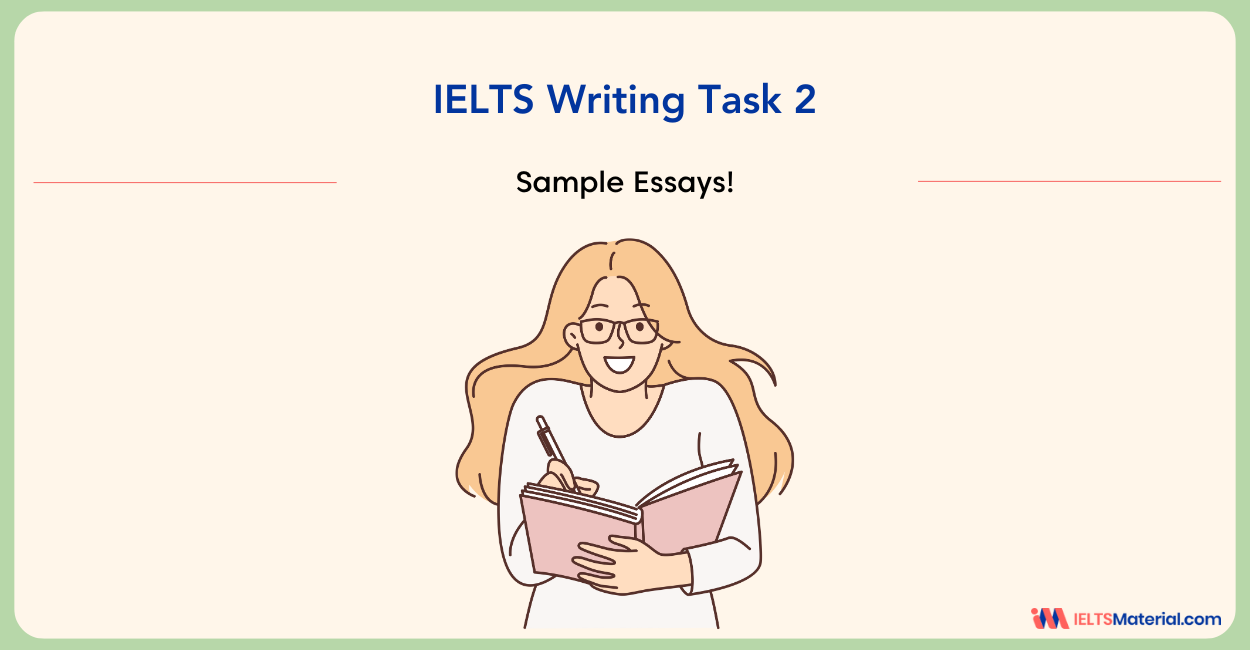
Kasturika Samanta

IELTSMaterial Master Program
1:1 Live Training with Band 9 Teachers
4.9 ( 3452 Reviews )
Our Offices
Gurgaon city scape, gurgaon bptp.
Step 1 of 3
Great going .
Get a free session from trainer
Have you taken test before?
Please select any option
Email test -->
Please enter Email ID
Mobile Band 9 trainer -->
Please enter phone number
Application
Please select any one
Already Registered?
Select a date
Please select a date
Select a time (IST Time Zone)
Please select a time
Mark Your Calendar: Free Session with Expert on
Which exam are you preparing?
Great Going!
IELTS Charlie
Your Guide to IELTS Band 7
IELTS Direct Question Essay: tips, common mistakes, questions & essays
In this lesson we are going to look at how to answer an IELTS Direct Question essay.
You will learn about this IELTS Writing Task 2 essay, using authentic IELTS essay questions , plus the most common mistakes. And I will finish with an IELTS model essay written by me in response to a sample IELTS essay question . So let’s get started!
What Is Your Task?
In this IELTS question type, you are usually asked 2 questions. Your task is to simply answer these questions!
Often, one or both of the 2 questions come from one of the other 4 question types, so you might be asked to say whether you agree or disagree, or to discuss the disadvantages of something, or to suggest some solutions.
So it’s really important to read the question carefully!
Here is an example direct questions essay task:
Some people spend most of their lives living close to where they were born.
What might be the reasons for this?
What are the advantages and disadvantages?
Cambridge IELTS 16 General Training Test 3
As you can see, this task has 2 questions. The 2nd question is about advantages and disadvantages, so the task takes the 2nd question from one of the other essay question types.
How To Plan An IELTS Direct Question Essay
If you are aiming for a high band score (band 7 and above) it is absolutely vital that you plan your essay. A good plan will help you to see if you have answered the question, developed your ideas and organised them BEFORE you start writing.
We’re going to plan an essay using my 4 Step Planning Process .

Step 1: Understand The Task
First, you need to make sure you understand exactly what you need to write about. So you need to read the question carefully, not quickly!
Think about these three questions:
What is the topic about?
What is the topic NOT about?
How should you respond to the topic?
Let’s go back to this essay question, and answer those 3 questions:
- The topic is about people who live near to the village / town of their birth for most of their lives.
- (The word “birthplace” implies the village / town of their birth, NOT the country of their birth.)
- It’s not about people who live ALL their lives near their birthplace.
- Because “birthplace” implies a village / town / city, it’s not about people who rarely go outside their country.
- The two questions, “what might be the reasons for this?” and “what are the advantages and disadvantages” tell you how to respond to the topic. So make sure you answer these questions in your plan.
- Many students might forget to answer the first question, and just write about the advantages and disadvantages. This will limit your band score for Task Response to Band 5.
Step 2: Decide Your Position
Next, you need to decide your position. In other words, you need to decide what you think.
In a direct questions essay, your position is your answers to the two questions .
So in our example above, your position is your answer to the 2 questions:
- what might be the reasons for people spending most of their lives near their birthplace?
- what are the advantages and disadvantages of spending most of your life near your birthplace?
Step 3: Extend Your Ideas
When you decided your position, you may have started thinking about the reasons for your position, the reasons for your answer. In other words, WHY are you taking this view?
Giving reasons for your view is essential in an IELTS essay. In fact, all IELTS questions tell you to “give reasons for your answer”. So in Step 3, you need to think about your reasons a little more.
However, just presenting your reasons is not enough. You need to develop them.
The two best ways of developing your ideas is by:
- giving explanations of what you mean
- giving specific examples which illustrate what you mean
Together, these add more detail to your answer.
You MUST do this to get Band 7. If you fail to develop your ideas in detail, your band score for Task Response may be limited to Band 6.
Read more about how to develop your ideas in an IELTS essay.
Step 4: Structure Your Essay
The final step in the planning process is to structure your essay. This simply means deciding which main ideas to put in which paragraphs.
I would recommend a simple structure like this:
- Paragraph 1: introduce the essay
- Paragraph 2: discuss your answer to the 1st question
- Paragraph 3: discuss your answer to the 2nd question
- Paragraph 4: summarise your ideas.

How To Write Your IELTS Direct Question Essay
Let’s go through how to write the different parts of the essay.
How To Write The Introduction
In the introduction to an IELTS Direct Questions essay, you need to do two things:
- briefly introduce the topic of the essay
- briefly say what you are going to write about
Introduce The Topic
You should begin with a background sentence which introduces your reader to the topic of the essay. The best way to do this is to paraphrase the topic statement.
How To Paraphrase
Think about the meaning of the topic statement, and briefly rewrite it using your own words. Try not to use the same grammatical structures as in the essay question, and try to move language around. In other words, be flexible. This is important if you are aiming for a Band 7 or higher.
In the example essay question above, the topic statement said:
“Some people spend most of their lives living close to where they were born.”
Here is one way of paraphrasing this:
“Despite opportunities to travel widely in the modern world, many people still live most of their lives not far from their birthplace.”
This sentence has a similar meaning as the original sentence, but uses different vocabulary and different grammatical structures.
Say What You Are Going To Write About
In an IELTS Direct Questions essays, it’s a good idea to briefly say what you are going to write about – in other words, say that you are going to answer the two questions.
In our example essay above, we need to answer two questions:
- What might be the reasons for this?
- What are the advantages and disadvantages?
So I could write:
“This essay will consider the reasons for this tendency, along with the possible benefits and drawbacks.”
How To Write The Body Paragraphs
In an IELTS Direct Questions essay, you simply need to answer the questions in the body paragraphs.
Write the answer to each question in a separate paragraph.
Direct questions essays can vary quite a lot, so you need to be flexible in your paragraphing.
In our example essay, the two questions are:
So, the first body paragraphs could contain:
- A reason why people live most of their lives near their birthplace
- A more detailed explanation of this reason
- An example which illustrates this reason
- You can also include a 2nd reason in the same paragraph.
The second body paragraph could contain:
- One advantage of living most of their life near their birthplace
- A more detailed explanation of this advantage
- An example which illustrates this advantage
You could include a disadvantage in the same paragraph, but I would personally write it in a separate paragraph:
- One disadvantage of living most of their life near their birthplace
- A more detailed explanation of this disadvantage
- An example which illustrates this disadvantage
(You probably only have enough time to write one advantage and one disadvantage in this essay, because you also have to write about the reasons for living in one place.)
You can read more about developing your ideas here .
How To Write The Conclusion
In the conclusion to an IELTS Direct Questions essay, you need to do one thing:
- summarise your main points
Do NOT write any new ideas in your conclusion. If you think of new ideas while writing your conclusion, forget them! It’s too late.
Common Mistakes in an IELTS Direct Question Essay
These are the most common mistakes made by Test Takers when writing an IELTS Direct Questions essay:
- not reading the question carefully enough. The questions in these essay types can vary a lot, so don’t read the questions quickly. Read them carefully.
- Writing an overly general statement about the topic in the introduction (e.g. Education is a topic of hot debate.
- Your main ideas are not explained and illustrated enough. You need to develop all of your ideas to get a band 7 and higher.
- Using memorised phrases (e.g. “a hot topic”, “in a nutshell”, “pros and cons”)
- Using “research studies” as examples: examples should illustrate your ideas, not prove them. Read about how to use examples in IELTS essays .
- Trying to use rare or “novel” language: examiners are looking for groups of words used naturally, not rare words.
Sample IELTS Direct Question Essay Questions
In some countries, more and more people are becoming interested in finding out about the history of the house or building they live in. What are the reasons for this? How can people research this?
(Cambridge IELTS 16 Academic Test 1)
In their advertising, businesses nowadays usually emphasise that their products are new in some way. Why is this? Do you think it is a positive or negative development?
(Cambridge IELTS 16 Academic Test 2)
In some countries, owning a home rather than renting one is very important for people. Why might this be the case? Do you think this is a positive or negative situation?
( Cambridge IELTS 15 Academic Test 1 )
In many countries today, crime novels and TV crime dramas are becoming more and more popular. Why do you think these books and TV shows are popular? What is your opinion of crime fiction and TV crime dramas?
(Cambridge IELTS 15 General Training Test 1)
Model IELTS Direct Question Essays
Here is an IELTS Direction Questions Essay that I wrote in response to this task:
In many countries today, crime novels and TV crime dramas are becoming more and more popular.
Why do you think these books and TV shows are popular?
What is your opinion of crime fiction and TV crime dramas?
Stories about criminal activity, both fictional and real-life, have become increasingly popular over the last few decades. There are many possible reasons for this, but the two primary ones that I can think of are the underlying desire of people to see good overcome evil, and a fascination with criminal lifestyles.
Almost all stories about crime, whether in print or on TV, are about good people, such as detectives and law-abiding civilians, triumphing over bad people, namely criminals. We often see this in fictional detective stories, where an otherwise ordinary person uses their intellect and skill to identify evil criminal masterminds. A good example of this is Miss Marple, an elderly woman who always manages to track down and apprehend evil criminals.
A second reason is that people have a fascination with the lives of criminals. Perhaps this is to do with people’s need for escapism. One of the most popular crime dramas in the UK of the last 20 years was ‘Legend’, a dramatisation of the lives of the Kray Twins, two violent London gang leaders of the 1960s. The film, which I watched on TV, portrayed their violent behaviour, along with their opulent and chaotic lifestyles, and I do feel that people find this compelling viewing, despite how it shows evil people succeeding.
Personally, unless it is related to real-life stories, I have little interest in either crime fiction or crime drama. I find their plots too repetitive. With true crime stories, however, I can learn something about social history and psychology. Why, for example, do people turn to lives of crime? Is it simply for money, or are they motivated by power as well? And what causes people to join gangs and follow people like the Krays? These are all interesting questions.
In summary, a desire to see good triumph over evil, along with a fascination with evil, are two reasons I think underlie the popularity of crime stories, but my interest in them is mainly limited to dramatisations of real lives.
(335 words)
Read my full plan and comments for this essay.
More IELTS Direct Question Sample Essays
Share this:.
- Click to share on Facebook (Opens in new window)
- Click to share on WhatsApp (Opens in new window)
- Click to share on Twitter (Opens in new window)
- Click to share on LinkedIn (Opens in new window)
- Click to share on Reddit (Opens in new window)
- Click to share on Pinterest (Opens in new window)
- Click to share on Telegram (Opens in new window)
- Click to share on Pocket (Opens in new window)
- Click to print (Opens in new window)
- Click to share on Tumblr (Opens in new window)
Related Posts

About the author
Charlie is a former IELTS Examiner with 25 years' teaching experience all over the world. His courses, for both English language learners and teachers, have been taken by over 100,000 students in over 160 countries around the world.
IELTS® is a registered trademark of Cambridge English Language Assessment, the British Council, and IDP Education Australia. By using this website, you agree that you fully understand that ieltscharlie.com is not affiliated, approved or endorsed by Cambridge English Language Assessment, the British Council, or IDP Education Australia.
Unit 22489, PO Box 6945, London, W1A 6US, United Kingdom
© IELTSCharlie
Privacy Overview
Discover the 7 STEPS to BAND 7 in IELTS Writing Task 2
- Phone: +91 8466016171
- Whatsapp: +91 8208375580
- Email: contact@leapscholar.com
Direct Question Essay in IELTS: Structure and Examples
- Last Updated On November 15, 2024
- Published In IELTS Preparation 💻

The International English Language Testing System (IELTS) is one of the globally recognised English proficiency exams. It is designed to assess the language skills of non-native English speakers. With over 3 million tests taken annually, it is accepted by more than 12,000 organisations worldwide, including universities, employers, and immigration authorities. In the IELTS Writing section, two tasks test different aspects of writing ability- Task 1 and Task 2- which we will explain in detail later . The Direct Question Essay in IELTS is a crucial component of the IELTS Writing Task 2 , often challenging you to address specific inquiries directly. Understanding this essay type is essential for achieving a high band score, as it assesses your ability to construct well-organised arguments and provide insightful responses to given prompts.
Table of Content
This blog delves into the definition, structure, and strategies for mastering Direct Question Essays structure, offering valuable insights and examples to guide you in your IELTS preparation.
Before getting started, let’s take you through the key details.
Task 1 and Task 2 in IELTS
The IELTS Writing section is a critical component of the exam, challenging candidates to demonstrate their proficiency in different types of writing. Each task has its unique requirements and focuses on distinct skills, making it essential to understand the nuances of both tasks for effective preparation. The tasks also differ in the Academic and General Training version of the IELTS test. Let’s walk you through the differences between the two tasks.
IELTS Academic Writing Tasks
Another important factor to keep in mind is that Task 1 and Task 2 under Academic Writing also differ. Now, let’s show you the differences so you can ace your exam!
Objectives and Examples of Tasks 1 and 2 Academic IELTS Task 1 (Academic) aims to assess your ability to identify key features, trends, and significant data in visual representations like graphs, charts, and tables. You are expected to describe the information accurately, highlight important trends, and compare and contrast data points where relevant.
For example, if you are given a line graph showing population growth in different countries over time, your task would be to describe the overall population growth trend, identify any significant fluctuations or patterns, and compare the growth rates between countries if applicable.
On the other hand, IELTS Task 2 (Academic) aims to evaluate your ability to present a clear and relevant argument, support it with evidence and examples, and demonstrate coherent and cohesive writing skills. You will be given a topic or statement and asked to discuss it from multiple perspectives, presenting both sides of the argument and providing your opinion or stance.
For instance, a Task 2 prompt could ask you to discuss both sides of an argument about whether governments should spend more on education. Here, you would need to present arguments supporting increased government spending on education and arguments against it, backed by evidence and examples. Additionally, you would offer your opinion while ensuring your essay is well-structured, coherent, and logically developed.
IELTS General Training Writing Tasks
Did you know that Task 1 and task 2 under General Training differ on the basis of what is supposed to be done, the word count and also the time duration? Let’s take you through the differences.
Objectives and Examples of Task 1 and 2 General Training
The IELTS General Training Writing Task 1 aims to communicate practical information, request information, or explain a situation through a letter.
For example, you might be asked to write a letter to a friend inviting them to visit and explain the details of their stay. This involves giving clear and concise information about the visit, such as dates, accommodation, activities planned, and any other relevant details to ensure your friend has a good understanding of what to expect. It’s essential to use a polite and friendly tone and structure your letter in a coherent and organised manner.
In IELTS General Training Writing Task 2, the objective is to present and justify an opinion, compare and contrast evidence, and demonstrate coherent and cohesive writing.
For instance, you might be asked to discuss the benefits and drawbacks of living in a big city. This task requires you to consider both sides of the argument, provide examples and evidence to support your points and organise your essay logically and clearly. You should aim to write in a balanced and objective way, showing your ability to construct a well-reasoned argument and to link your ideas effectively.

Excel in IELTS with India’s Top Online Coaching
Leap has helped more than 1 Lakh students achieve 7+ IELTS band.
Types of IELTS Essays for Writing Task 2 Topics
You may encounter different essay prompts in the IELTS Writing Task 2. Understanding these types is crucial for crafting well-structured responses. Most IELTS test-takers also believe that familiarising themselves with essay types significantly improves their writing scores. Understanding these types helps structure responses effectively. Here are the common types:
- Description : These essays ask you to agree or disagree with a statement or to what extent you agree/disagree.
- Example : “To what extent do you agree or disagree with the statement: ‘Technology has made our lives more complex.'”
- Description : These require you to discuss two opposing views and give your own opinion.
- Example : “Some people believe that higher education should be free for everyone, while others think students should pay for their studies. Discuss both views and give your opinion.”
- Description : These ask you to discuss the advantages and disadvantages of a particular issue.
- Example : “What are the advantages and disadvantages of using public transportation?”
- Description : These require you to identify problems related to a particular issue and propose solutions.
- Example : “What are the major environmental issues facing the world today, and what measures can be taken to address them?”
- Description : These essays ask a direct question and expect a specific answer.
- Example: “The use of social media has grown significantly in recent years. What impact does this have on relationships and communication?”
Now, let’s walk you step by step through the important aspects of the Direct Question Essay in IELTS.
What is Direct Question Essay in IELTS?
In the context of IELTS, a Direct Question Essay requires you to respond to one or more questions in the prompt.
Unlike other essay types, such as opinion or discussion essays, the Direct Question Essay in IELTS demands a focused response that comprehensively addresses each part of the question. This essay type tests your ability to provide clear, coherent, and relevant answers, showcasing your language proficiency and critical thinking skills.
Explore all countries
Importance of direct question essay in ielts writing task 2.
Direct Question Essay in IELTS plays a significant role in IELTS Writing Task 2, often appearing in exams.
It evaluates your ability to understand and interpret questions accurately, structure your responses logically, and support your arguments with relevant examples.
Achieving proficiency in this essay type can significantly impact your overall writing score, making it a vital area of preparation for IELTS candidates.
Excel in IELTS with Expert Guidance! Contact Leap Scholar to learn from India’s best-rated IELTS trainers , with an average student rating of 4.5/5.
Sample Questions and Approaches
Understanding how to approach different Direct Question Essay IELTS topics can significantly enhance your preparation. This section provides sample questions and outlines model answer approaches to guide you.
Sample Question and Answer on the Importance of Practical Skills in Education
Sample Question : Some people believe that practical skills are more important than theoretical knowledge in education. To what extent do you agree or disagree? Provide examples to support your opinion.
Model Answer Outline :
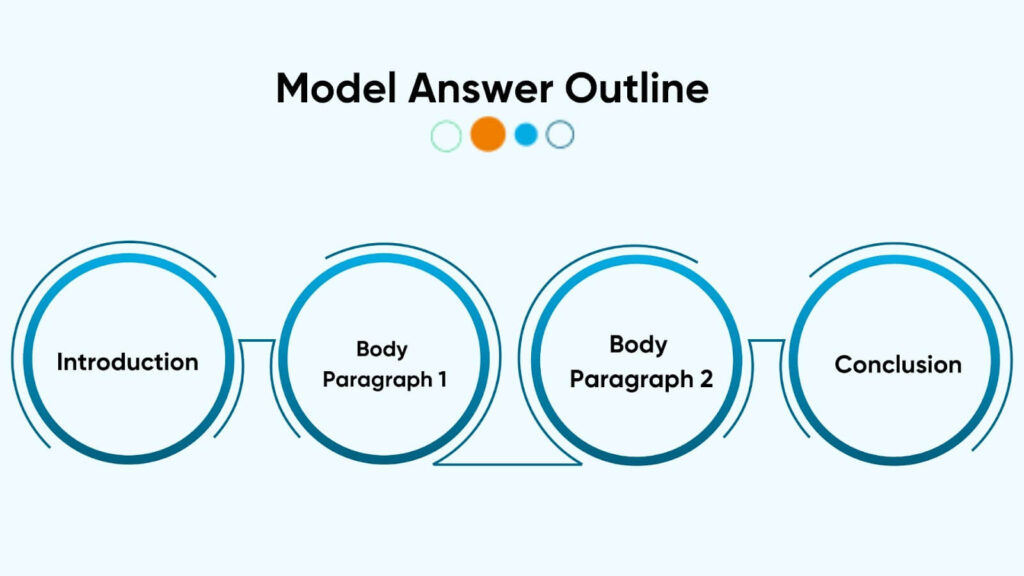
- Introduction: Paraphrase the question, provide background information on practical skills vs. theoretical knowledge, and state the thesis.
- Body Paragraph 1: Discuss the importance of practical skills, providing examples from vocational training.
- Body Paragraph 2: Highlight the role of theoretical knowledge, giving examples from academic disciplines.
- Conclusion: Summarise the main points and reiterate the balanced view on the importance of both practical skills and theoretical knowledge.
SAMPLE ANSWER Practical Skills vs. Theoretical Knowledge in Education
The debate over whether practical skills or theoretical knowledge are more important in education has been a longstanding one. Some people believe that practical skills are more beneficial, while others argue that theoretical knowledge forms the backbone of education. In this essay, I will explore both perspectives and argue that a balanced approach, incorporating both practical skills and theoretical knowledge, is essential for a comprehensive education.
Importance of Practical Skills
From my experience, practical skills are crucial because they prepare individuals for real-world applications. Vocational training, for example, focuses on hands-on experience, teaching students how to apply their knowledge in practical settings. In fields such as plumbing, carpentry, and the culinary arts, practical skills are paramount. When I studied culinary arts, I found that spending time in the kitchen, learning techniques and recipes firsthand, was invaluable. This hands-on experience equipped me with the skills necessary to excel in my chosen profession.
Role of Theoretical Knowledge
On the other hand, theoretical knowledge provides the foundational understanding necessary for practical application. Academic disciplines such as medicine, engineering, and the sciences rely heavily on theoretical frameworks. When I was studying medicine, I realised that grasping complex biological and chemical principles was essential before I could effectively diagnose and treat patients. Similarly, an engineering student needs to understand physics and mathematics to design and build safe structures. Without a strong theoretical foundation, practical skills alone may be insufficient and potentially dangerous.
In conclusion, I believe that both practical skills and theoretical knowledge play vital roles in education. Practical skills provide the hands-on experience needed for real-world applications, while theoretical knowledge offers the essential foundation for understanding and innovation. A balanced approach, integrating both elements, ensures that students are well-equipped to succeed in their careers and contribute meaningfully to society.
Sample Question on Discussing the Role of the Internet and Information Reliability with Examples
Sample Question : The internet provides a vast amount of information, but the reliability of this information is often questioned. Discuss the impact of the internet on information reliability, providing examples.
- Introduction: Paraphrase the question, discuss the prevalence of internet information, and state the thesis.
- Body Paragraph 1: Examine the benefits of internet information, providing examples of accessible educational resources.
- Body Paragraph 2: Discuss the challenges of information reliability, giving examples of misinformation and fake news.
- Conclusion: Summarise main points and emphasise the need for critical evaluation of online information.
Sample Question on Addressing Happiness, Success Measurements, and Their Nuances
Sample Question : Some people think that happiness is the key to success, while others believe that success leads to happiness. Discuss both views and give your opinion.
- Introduction: Paraphrase the question, provide context on happiness and success, and state the thesis.
- Body Paragraph 1: Discuss the view that happiness leads to success, giving examples from personal well-being and productivity.
- Body Paragraph 2: Explore the perspective that success brings happiness, providing examples from career achievements and financial stability.
- Conclusion: Summarise the main points and present a balanced opinion on the interrelationship between happiness and success.
SAMPLE ANSWER
The Interrelationship Between Happiness and Success
The debate over whether happiness is the key to success or whether success leads to happiness has intrigued many. Some argue that being happy naturally leads to success, while others contend that achieving success brings about happiness. In this essay, I will discuss both viewpoints and provide my opinion on the interrelationship between happiness and success.
Happiness Leads to Success
One perspective is that happiness fosters success. When individuals are happy, they tend to have better mental health and higher energy levels, which can lead to increased productivity and creativity. For instance, I have noticed that when I am in a good mood, I am more focused and motivated to work hard, which often results in better outcomes. Furthermore, happy people are generally more resilient and capable of handling stress, which can contribute to achieving long-term goals. This suggests that a positive state of mind can significantly enhance one’s chances of success.
Success Brings Happiness
On the other hand, some believe that success brings happiness. Achieving career milestones or financial stability can lead to a sense of accomplishment and security, which in turn fosters happiness. For example, when I achieved a major career goal, the recognition and rewards that followed significantly boosted my overall happiness. Similarly, financial success can alleviate stress and provide opportunities for enjoying life, such as travelling or pursuing hobbies. This viewpoint implies that success can create the conditions necessary for a happy and fulfilling life.
In conclusion, both happiness and success are closely intertwined and can influence each other. Happiness can enhance productivity and resilience, leading to success, while success can provide the security and satisfaction that contribute to happiness. I believe that fostering happiness and striving for success should go hand in hand, as both elements are essential for a well-rounded and fulfilling life.
Sample Question on Cultural Adaptation During Travel
Travelling to a new country requires adapting to its culture. Discuss the importance of cultural adaptation during travel, providing examples.
- Introduction: Paraphrase the question, discuss the necessity of cultural adaptation, and state the thesis.
- Body Paragraph 1: Analyse the benefits of cultural adaptation, giving examples from language learning and social integration.
- Body Paragraph 2: Examine the challenges of cultural adaptation, providing examples from cultural misunderstandings and adjustment difficulties.
- Conclusion: Summarise the main points and emphasise the significance of embracing cultural diversity during travel.
Achieve Your Dream IELTS Score! Get in touch with Leap Scholar and learn from India’s top IELTS trainers.
Sample Question on Exploring the Significance of Art and Music in the Technological Era
In today’s technological era, what is the significance of art and music? Provide examples to support your answer.
- Introduction: Paraphrase the question, discuss the technological era’s impact on art and music, and state the thesis.
- Body Paragraph 1: Highlight the enduring relevance of art, giving examples from contemporary visual arts and digital media.
- Body Paragraph 2: Discuss the importance of music, providing examples from the music industry’s evolution and digital platforms.
- Conclusion: Summarise the main points and reaffirm the vital role of art and music in the technological age.
Understanding the Essay Structure
Did you know IELTS is available in over 4,000 test locations in 140 countries? Mastering the essay structure is crucial to writing effective direct-question essays in IELTS. This section breaks down the key components and provides tips for crafting each part effectively.
Introduction: Paraphrase the Question and Provide Background Information
Your introduction should begin by paraphrasing the question, demonstrating an understanding of the prompt. Some background information helps set the context, making it easier for readers to follow your subsequent arguments. This section should also include a thesis statement outlining the main points discussed in the essay.
Body Paragraph 1: Discuss the First Aspect of the Question with Examples
The first body paragraph should address the initial aspect of the question, offering a detailed discussion supported by relevant examples. The initial aspect refers to the first part of the question or the first issue presented. For instance, in the question, “The use of social media has grown significantly in recent years. What impact does this have on relationships and communication?” the initial aspect would be “the positive impact of social media on relationships and communication.”
This paragraph should present a clear argument, ensuring each point is well-explained and logically connected to your essay’s overall thesis.
Body Paragraph 2: Examine the Second Aspect of the Question, Providing Explanations and Examples
The second body paragraph should focus on the other aspect of the question , providing thorough explanations and examples. The second aspect refers to the second part of the question or the secondary approach. For instance, in the question, “The use of social media has grown significantly in recent years. What impact does this have on relationships and communication?” The next aspect would be “the negative impact of social media on relationships and communication.”
This section should build upon the points in the first body paragraph, offering additional insights and reinforcing your essay’s main arguments.
Conclusion: Summarise Main Points and Reiterate Your Opinion
Your conclusion should briefly summarise the main points discussed in the essay, reiterating the thesis statement. It should provide a clear and concise wrap-up, leaving a lasting impression on the reader. This section should not introduce new information but rather reinforce the key arguments presented earlier.
Also Read: 60+ IELTS Essay Topics 2024: IELTS Writing Task 2 Samples & Tips
Strategies for Writing Direct Question Essay in IELTS
Are you aware that around 80% of IELTS test-takers take the exam for academic purposes, such as university admission, while 20% take it for immigration and employment purposes?
To write effective direct-question essays in IELTS, you should employ various strategies that ensure your responses are clear, coherent, and well-supported. This section outlines essential techniques for mastering this essay type.
Time Management: Dividing Time for Planning, Writing, and Reviewing
Effective time management is crucial for writing a well-structured essay. Allocate sufficient planning, writing, and reviewing time to ensure a comprehensive and polished response. Here is a table showcasing approximately how much time you should spend on each stage.
Answer Planning: Structuring Answers to Each Question for Coherence
Planning your answer involves outlining the main points and examples for each question. This helps maintain coherence and ensures that all aspects and possibilities of the question are addressed. Creating a clear outline before writing can enhance your essay’s structure and flow.
Importance of Paraphrasing the Question in the Introduction
Paraphrasing the question in the introduction demonstrates comprehension and sets the tone for the essay. It helps avoid repetition and shows the examiner that you can interpret and articulate the question in your own words.
Developing Arguments: Supporting Main Points with Examples and Explanations
Strong arguments are essential for a high-scoring essay. Each main point should be supported with relevant examples and detailed explanations. This strengthens the argument and showcases your ability to provide evidence and logical reasoning.
Example 1: Positive Impact of Social Media on Relationships
Main Point: Social media helps maintain relationships over long distances.
Explanation: With platforms like Facebook and Instagram, people can stay updated on their friends and family members’ lives, even if they are geographically separated.
Example: For instance, a person living in the United States can easily keep in touch with a friend in Australia by sharing photos, sending messages, and having video calls. This continuous interaction helps maintain a strong bond despite the physical distance.
Example 2: Negative Impact of Social Media on Relationships
Main Point: Social media can lead to superficial relationships.
Explanation: Online interactions often lack the depth and emotional connection of face-to-face conversations, leading to more shallow relationships.
Example: For example, a study by the Pew Research Center found that while people may have hundreds of friends on social media, they often feel lonelier and have fewer close friends with whom they can share personal issues. This indicates that social media can contribute to a sense of isolation despite an increase in the number of online connections.
Get the Best Live Learning Experience! Sign up with Leap Scholar for live IELTS online classes and 6-month access to class recordings.
Ensuring Coherence and Clarity in the Essay
Coherence and clarity are vital for effective communication. Ensure each paragraph transitions smoothly to the next, maintaining a logical flow. Use cohesive devices such as linking words and phrases to enhance readability.
Example: Paragraph Transition: “Despite the many benefits of social media, there are also significant drawbacks that cannot be ignored.”
Using Linking Words and Phrases: “Firstly, social media can create superficial relationships, as interactions online often lack the emotional depth of face-to-face conversations. Additionally, it can lead to misunderstandings due to the absence of non-verbal cues. Moreover, excessive use of social media can result in addiction, thereby reducing the time available for meaningful, in-person interactions.”
Before: “Social media helps maintain relationships. People can stay updated on their friends’ lives. It can lead to superficial relationships. Online interactions lack depth.”
After (with coherence and clarity): “Social media helps maintain relationships by allowing individuals to stay updated on their friends’ lives through platforms like Facebook and Instagram. However, it can also lead to superficial relationships, as online interactions often lack the depth and emotional connection of face-to-face conversations. This duality highlights the complex impact of social media on modern relationships.”
Developing strong arguments with examples and ensuring coherence and clarity will make your essay well-structured and persuasive.
Vocabulary and Grammar: Utilising a Broad Lexical Range and Accurate Grammar
A wide range of vocabulary and accurate grammar are vital components of a high-scoring essay. Use varied and sophisticated language to convey ideas clearly and effectively. Attention to grammar and punctuation to avoid errors that can detract from the essay’s overall quality.
Lexical range refers to the variety and sophistication of the words and phrases you use in your writing. A broad lexical range demonstrates your ability to use different words to express similar ideas, avoiding repetition and making your writing more engaging and precise. It involves using synonyms, advanced vocabulary, varied sentence structures, idioms and phrases.
Join the PAN India IELTS Community! Reach out to Leap Scholar and start your journey towards a high IELTS score.
Check Out: IELTS Test Online: Free Sample Papers & Study Guide for 2024
Key Tips for Direct Question Essay IELTS Success
Mastering Direct Question Essays in IELTS requires careful attention to detail and strategic planning. This section offers vital tips for improving your essay writing skills and achieving higher scores. Let’s explain the points with relevant examples on the topic: Impact of Social Media on Relationships and Communication.
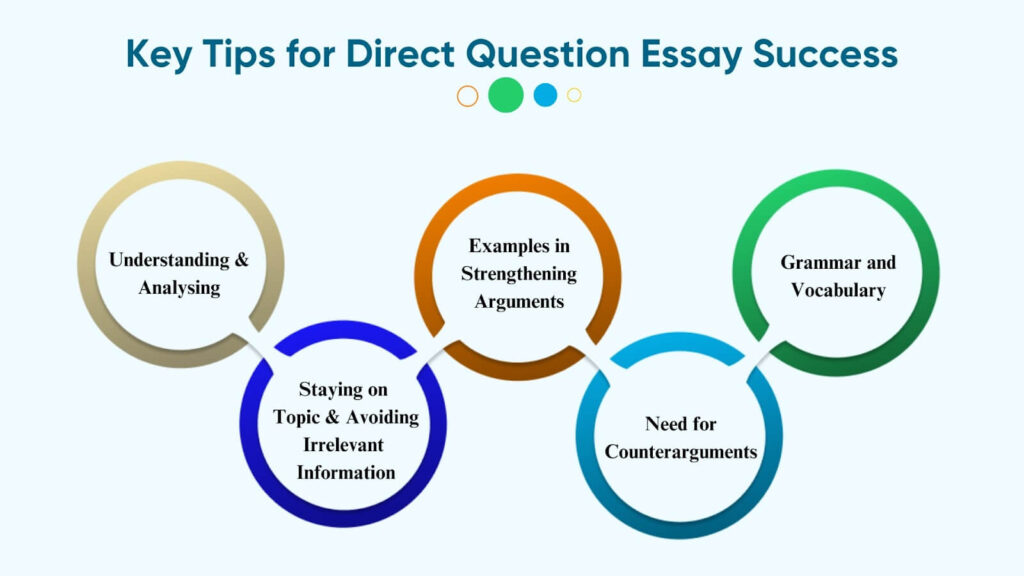
Understanding and Analysing the Questions Carefully
Carefully analyse questions to provide focused responses. Address all parts of the question.
- For example, if asked about the impact of social media on communication, cover both positive and negative aspects.
Staying on Topic and Avoiding Irrelevant Information
Staying on topic is essential for maintaining coherence and clarity. Avoid including irrelevant information that does not directly relate to the question or support the main arguments.
- For instance: When discussing the benefits of social media, avoid tangents about unrelated technologies.
The Role of Examples in Strengthening Arguments
Examples strengthen arguments by providing evidence. Use specific, relevant examples to illustrate your points.
- For example, mention how social media enabled remote communication during the COVID-19 pandemic.
The Need for Counterarguments to Showcase Critical Thinking
Counterarguments showcase critical thinking and provide a balanced perspective. Address and refute opposing viewpoints with logical reasoning.
- For example, while social media enhances connectivity, it can lead to addiction—suggest moderation to mitigate this.
Grammar and Vocabulary: Making the Essay Stand Out
Use a broad vocabulary and accurate grammar to make your essay stand out. Employ varied, sophisticated language and ensure correct grammar and punctuation.
- For instance, instead of “important,” use “paramount” or “crucial” to add depth.
By following these guidelines and strategies, you can master the Direct Question Essay in IELTS, significantly improving your writing score and overall exam performance.
Also Read: IELTS Writing Samples 2024: Task 1 & Task 2 (Sample Questions & Tips)
In conclusion, mastering the Direct Question Essay in IELTS Writing Task 2 requires a strategic approach and thorough preparation. Focus on structuring your essay clearly, beginning with an introduction that paraphrases the question and sets the context.
Develop detailed body paragraphs that address each aspect of the question with relevant examples, and conclude by summarising your main points.
Effective time management is key—plan, write, and review within the allotted time. Outlining your main points and examples will ensure coherence. You can also enhance your essay with varied vocabulary and accurate grammar. Incorporating personal examples can add authenticity, while counterarguments demonstrate critical thinking.
By following these strategies and practising consistently, you can confidently tackle Direct Question Essays and achieve a higher band score in the IELTS exam. Each essay is an opportunity to showcase your language proficiency and communication skills, so refine your approach and deliver your best performance.
Ready for IELTS Success? Connect with Leap Scholar today and join 90% of our students who score 7+ bands!
Frequently Asked Questions
Q. what is the ielts exam.
A. The International English Language Testing System (IELTS) is a standardised test designed to measure the English language proficiency of non-native English speakers. The British Council, IDP: IELTS Australia, and Cambridge Assessment English jointly manage it. IELTS is widely recognised by educational institutions, employers, and immigration authorities in over 140 countries.
Q. What are the different versions of the IELTS test?
A. There are two versions of the IELTS test: Academic : This version is for those applying for higher education or professional registration. General Training : This version is for those migrating to an English-speaking country or seeking secondary education, work experience, or training programmes.
Q. How is the IELTS test structured?
A. The IELTS test comprises four sections: Listening : 30 minutes Reading : 60 minutes Writing : 60 minutes Speaking : 11-14 minutes
The total test duration is 2 hours and 45 minutes.
Q. How is the IELTS speaking test conducted?
A. The IELTS speaking test is a face-to-face interview with a certified examiner. It lasts 11-14 minutes and is divided into three parts: Part 1 : Introduction and interview (4-5 minutes) Part 2 : Long turn (3-4 minutes, including preparation time) Part 3 : Discussion (4-5 minutes)
Q. How long are IELTS scores valid?
A. IELTS scores are valid for two years from the test date. After this period, test takers may need to retake the exam to provide up-to-date evidence of their English language proficiency.
Q. How much does the IELTS test cost?
A. The cost of the IELTS test varies by country and test centre. On average, the test fee ranges around INR 17K . It is recommended to check with your local test centre for the exact fee in your region.
Q. How soon will I receive my IELTS test results?
A. IELTS test results are typically available 13 days after the test date for paper-based tests. For computer-delivered tests, results are usually available within 5-7 days. You can access your results online, and a Test Report Form (TRF) will be sent to you by post.
Q. What is a Direct Question Essay in the IELTS Writing Task 2?
A. In the IELTS Writing Task 2, a Direct Question Essay requires you to respond to one or more questions directly related to a given topic. You need to address each question in a structured manner, typically including an introduction, body paragraphs for each question, and a conclusion. This essay type tests your ability to answer specific questions clearly and coherently.
Q. What is Direct Question Essay Structure in IELTS Writing Task 2?
A. A well-structured Direct Question Essay template should include: Introduction : Paraphrase the question and provide background information. Body Paragraph 1 : Discuss the first aspect of the question with examples. Body Paragraph 2 : Examine the second aspect of the question, providing explanations and examples. Conclusion : Summarise the main points and reiterate your opinion.
Q. What are some strategies for writing a successful Direct Question Essay IELTS?
A. To write a successful Direct Question Essay, IELTS : Time Management : Allocate time for planning, writing, and reviewing. Answer Planning : Structure your answers to ensure coherence. Paraphrasing : Paraphrase the question in the introduction to show understanding. Arguments and Examples : Develop arguments supported by relevant examples. Coherence and Clarity : Ensure your essay is coherent and easy to follow. Vocabulary and Grammar : Use a broad range of vocabulary and accurate grammar.
Q. Can you provide a sample question for a Direct Question Essay IELTS and an outline for the answer?
A. Sure! Here is a sample question: – Question : “Some people think that practical skills are more important than theoretical knowledge. To what extent do you agree or disagree?” – Outline : 1. Introduction : Paraphrase the question and state your opinion. 2. Body Paragraph 1 : Discuss the importance of practical skills with examples. 3. Body Paragraph 2 : Examine the role of theoretical knowledge, providing explanations and examples. 4. Conclusion : Summarise the main points and restate your opinion. 5. Stay on Topic : Ensure all parts of your essay address the question directly.
Q. Can I use personal examples in a Direct Question Essay IELTS?
A. Yes, you can use personal examples in a Direct Question Essay IELTS. Personal examples can make your essay more relatable and authentic. However, ensure that the examples are relevant to the question and support your arguments effectively. Personal examples should be clear, concise, and directly related to the topic.
Know More about IELTS
Ielts practice test material, know more about ielts, get free speaking practice samples.
- Describe a Skill That you can teach other people
- Describe a Place you Visited Where the Air was Polluted
- Describe a Famous Person that you are Interested in
- Describe a Course That You Want to Learn
- Describe a Person who Solved a Problem in Smart Way
- Describe a Prize That You Received
- Describe a Volunteering Experience You Have Had
- Describe a Piece of Good News
- Describe Something you Taught to Your Friend
- Talk About an Interesting Old Person you Met Recently
- Describe a Dinner you Really Enjoyed
- Describe a Story or Novel That Was Interesting to You
- Describe a Time When you Shared Something with Others
- Describe a Toy you Liked in Childhood
- Describe an Interesting Neighbour
- Describe a Competition You Would Like to Take Part In
- Describe an interesting activity that you remember enjoying most in your Primary School
- Describe Your Childhood Friend
- Describe an Object You Find Particularly Beautiful
- Describe a Place Where you are Able to Relax
- Describe a person you know who likes to talk a lot
- Describe a place where you would like to go to relax
- Describe a period when you were busy
- Describe a long-term goal you would like to achieve
- Describe a situation when you helped someone
- Describe a job you would not like to do in the future
- Describe a time when you used a map
- Describe a skill that you learned in your childhood
- Describe an unusual holiday you had
- Describe an exciting activity that you experienced with someone else
- Describe a person who is good at making people feel welcome in his/her home
- Describe A Time You Successfully Did Something Difficult
- Describe Something in Your Country That You Are Interested In
- Describe a Beautiful City
- Describe something you do regularly that helps you work and study better
- Describe a photo that you took and are proud of
- Describe a party that you enjoyed
- Describe a useful object in your home that you can’t live without
- Describe a good advertisement that you think is useful
- Describe an occasion when someone or something made noise
- Describe a sportsperson that you admire
- Describe something that you picked up that was thrown by someone else
- Describe a time that something changed your life in good ways
- Describe a successful person who you once studied or worked with
Get Free Reading Practice Samples
- William henry perkin reading answers
- Why zoos are good reading answers
- Bioluminescence reading answers
- Classifying societies reading answers
- Artificial artists reading answers
- Jargon reading answers
- The Origins of Laughter Reading Answers
- The Innovation of Grocery Stores Reading Answers
- All About the Otter Reading Answers
- The Triune Brain Reading Answers
- Saving the Soil Reading Answers
- Trans Fatty Acids Reading Answers
- A Disaster of Titanic Proportions Reading Answers
- Why Companies Should Welcome Disorder Reading Answers
- Book Review Reading Answers
- Tea Times Reading Answers
- Why are Finland's Schools Successful Reading Answers
- Intelligence and Giftedness Reading Answers
- Animal Minds Parrot Alex Reading Answers
- Crop Growing Skyscrapers Reading Answers
- Secrets of the Swarm Reading Answers
- Walking with Dinosaurs Reading Answers
- The Development of Travel Under the Ocean Reading Answers
- What's so Funny Reading Answers
- The Culture of Chimpanzee Reading Answers
- Clutter Bugs Beware Reading Answer
- Stepwells Reading Answers
- Glaciers Reading Answers
Get Free Writing Practice Samples
- Advantages and Disadvantages Essay with Sample Answers
- Agree and Disagree Essay with Sample Answers
- Problem Solution Essay Topic with Sample Answers
- Every year several languages die out
- Positive or Negative Development Essay with Sample Answers
- Honesty is the best policy essay
- Online shopping essay
- Environment essay topics
- Prevention is better than cure essay
Get Free Listening Practice Samples
- Family excursions listening answers
- Public library listening answers
- Hiring a public room listening answers
- Notes on social programme listening answers
- Accommodation request form listening answers
- Transport survey listening answers
- Mic house agency repairs listening answers
- Holiday rentals listening answer
- Job enquiry listening answers
- Homestay application listening answers
- Library information listening answers
- Free activities in the burnham area listening answers
IELTS Important Information
- IELTS Exam Date
- IELTS Exam Fee
- IELTS Modules
- IELTS Speaking Practice Test
- IELTS Writing Practice Test
- IELTS Reading Practice Test
- IELTS Listening Practice Test
- IELTS Test Centres
- IELTS Results
- Types of IELTS
- IELTS Pattern
- IELTS Exam Eligibilty
- IELTS Slot Booking
- IELTS Band Score
- IELTS Registration
- IELTS Books
- IELTS Preparation
- IELTS Practice Test
- IELTS Speaking Cue Card
- IELTS Speaking Part 1
- IELTS Writing Task 1
- IELTS Writing Task 2
- Task 1 Pie Chart
- Task 1 Table Chart
- Task 1 Bar Graph
- Task 1 Line Graph
- Task 1 Diagram
- IELTS Computer Based Test
- IELTS Paper Based Test
- IELTS One Skill Retake
- IELTS for UKVI
- IELTS Vocabulary
IELTS Test Centre and Dates in India
- IELTS Test Centre and Dates in Hyderabad
- IELTS Test Centre and Dates in Bangalore
- IELTS Test Centre and Dates in Chennai
- IELTS Test Centre and Dates in Amritsar
- IELTS Centre and Dates in Ludhiana
- IELTS Test Centre and Dates in Mumbai
- IELTS Test Centres and Dates in Ahmedabad
- IELTS Centre and Dates in Delhi
- IELTS Test Centres and Dates in Chandigarh
- IELTS Center and Dates in Pune
IELTS Coaching
- IELTS coaching in Chandigarh
- IELTS coaching in Chennai
- IELTS coaching in Hyderabad
- IELTS coaching in Ahmedabad
- IELTS coaching in Dehradun
- IELTS coaching in Bangalore
- IELTS coaching in Jaipur
- IELTS coaching in Laxmi Nagar
- IELTS coaching in Coimbatore
- IELTS coaching in Trivandrum
- IELTS coaching in Gurgaon
Saloni Gupta
Hi, I'm Saloni, an experienced writer with specialization in preparing test material for English proficiency tests, particularly in IELTS. My strong understanding of SEO allows me to create informative and engaging material that helps students make the right decisions about pursuing their international academic and professional goals.

Personality Vocabulary IELTS: About People & Personalities

IELTS Academic or General: Which is the Easiest Test?

IELTS Connectors and Linking Words for 2024
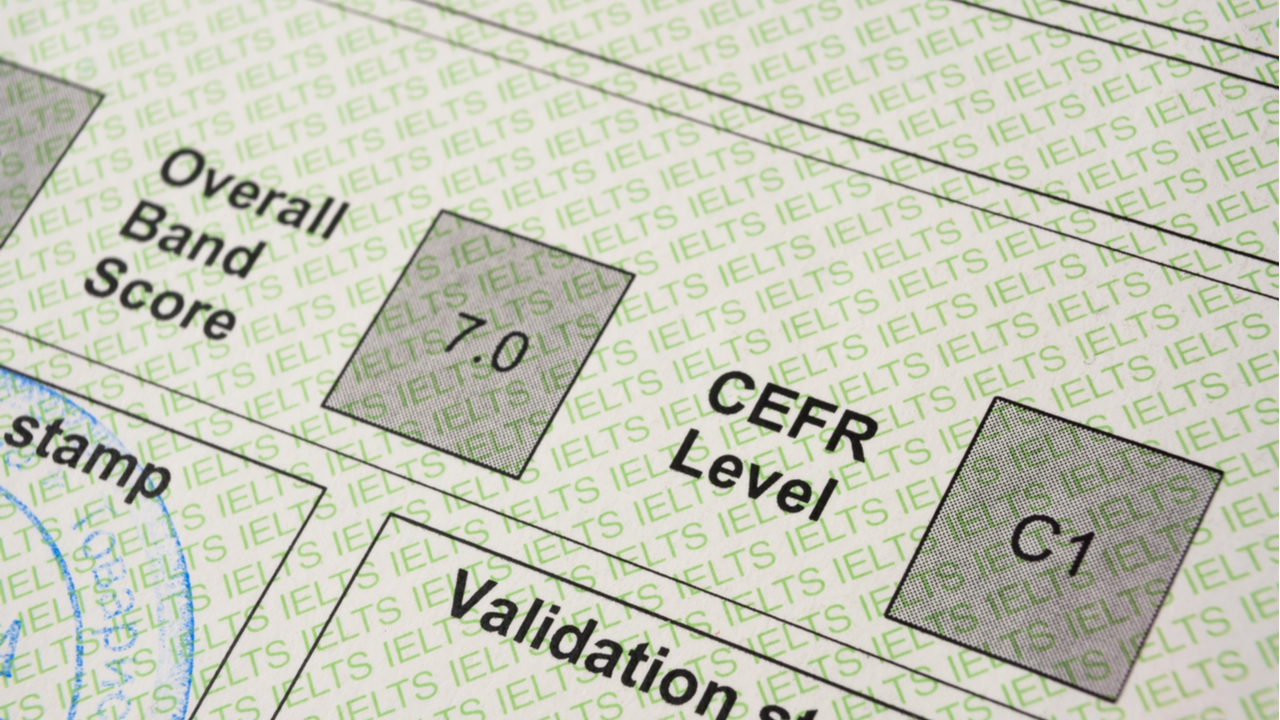
CEFR Levels In IELTS: 2024 Guide to CEFR Levels For Language Proficiency Tests
Love this blog share the love.
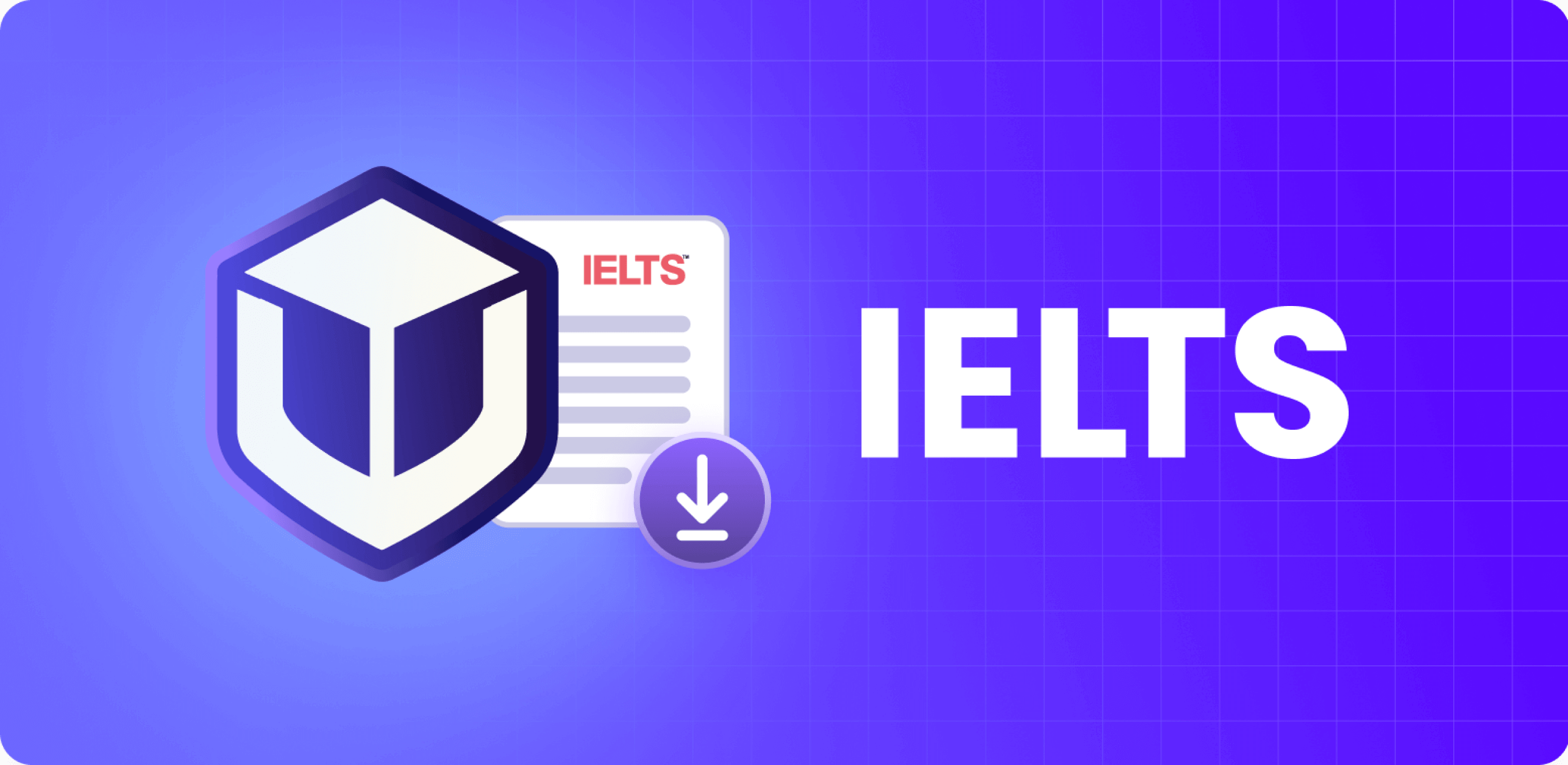
Learn how to prepare for IELTS
- 2L+ Leap students sent abroad
- 2L+ students scored 7+ bands

Have Questions? Get Guidance to reach your Dream University
Connect with India's finest counsellors and biggest study abroad community.
Get Guidance
Related Blogs

Stanford University Scholarship For Indian Students 2025: Eligibility & Costs
- November 15, 2024

Best Country for Masters (MS) for Indian Students in 2025
- November 19, 2024
- 14 min read

IELTS Accepting Universities in the USA: Your Path to Academic Success
- November 13, 2024
- 11 min read

Top 10 Highest Paying Jobs in Canada for 2025
- 13 min read

1 Year Courses in UK for International Students 2025
- 10 min read

PTE Band Score Chart: Understanding Score Calculation and Conversion in 2025
Popular blogs.

Education Loan for Studying in UK for International Students: Complete Details!
- 14 Min Read

Duolingo Accepted Universities in Germany 2024-2025
- 12 Min Read

Tier 1 Universities in USA for 2025: Cost of Studying, Eligibilty & Scholarships

How to Write a Perfect SOP for Germany?
- 17 Min Read

Affordable & Cheapest Universities in New Zealand for International Students 2025
- 10 Min Read

1 Year MBA in Canada: Fees, Programs & Universities for Indian Students
- 13 Min Read
Crack IELTS with
7+ bands in 4 weeks.
Get Guidance to reach your
Dream university.
- Ebooks & Courses
- Practice Tests
How to Plan & Write IELTS Double Question Essays
IELTS double question essays are also known as ‘direct question’ or ‘two questions’ essays. They are distinguished by two characteristics:
- They have one statement with two different questions after it.
- The questions may or may not be linked.
Here are 3 examples:
1) Fossil fuels are essential for producing electricity, powering industry and fueling transportation. However, one day we will reach a point when all the world’s fossil fuels have been depleted.
How can we conserve these resources?
What are some alternatives to fossil fuels?
2) Some parents buy their children whatever they ask for, and allow their children to do whatever they want.
Is this a good way to raise children?
What consequences could this style of parenting have for children as they get older?
3) The arts, including art, music and theatre are considered to be important in society.
Do you think the arts still have a place amongst our modern lifestyles?
Should the arts be included in the school curriculum?
In this lesson, I’m going to demonstrate step-by-step how to plan and write IELTS double question essays.
Here’s what we’ll be covering:
- 3 Common mistakes
- Essay structure
- How to plan
- How to write an introduction
- How to write main body paragraphs
- How to write a conclusion
Want to watch and listen to this lesson?
Click on this video.
Click the links to see lessons on each of these Task 2 essay writing topics.
Once you understand the process, practice on past questions. Take your time at first and gradually speed up until you can plan and write an essay of at least 250 words in the 40 minutes allowed in the exam.
3 Common Mistakes
These three errors are common in IELTS double question essays.
- Not answering both questions fully.
- Not outlining both answers in the introduction.
- Mistaking it for one of the other essay types.
Many students make the mistake of only answering one of the questions, or focusing more on one question than the other which leads to an unbalanced essay. Both these errors will seriously affect your score for task achievement.
You must outline everything you are going to write about in the introduction. This is your blueprint for the whole essay. I’ll show you how to do this and get your essay off to a great start.
It’s easy to mistake IELTS double question essays for one of the other four types of Task 2 essays, especially opinion or discussion essays. Each should be answered in a slightly different way.
Analysing the question properly is essential to avoiding this error. I’ll also show you how to do this and give you a simple 4 part structure for planning your essay.
Essay Structure
Let’s look at this essay structure straight away. You can use it to write any IELTS double question essay. It’s easy to learn and will enable you to quickly plan and write a high-level essay.
1) Introduction
- Paraphrase the question
- Outline sentence – state your answer to both questions
2) Main body paragraph 1 – Answer question 1
- Topic sentence – state your answer
- Explanation – develop the idea
- Example – give an example
3) Main body paragraph 2 – Answer question 2
4) Conclusion Summarise both questions and answers
This structure will give us a well-balanced essay with 4 paragraphs.
We now need some ideas to add to the structure and we’ll have everything we need for our essay.
How To Plan IELTS Double Question Essays
Here’s the question we’re going to be answering in our model essay followed by the 3 steps of the planning process.
Fossil fuels are essential for producing electricity, powering industry and fueling transportation. However, one day we will reach a point when all the world’s fossil fuels have been depleted.
- Analyse the question
- Generate ideas
- Identify vocabulary
# 1 Analyse the question
This is an essential step in the planning process and will ensure that you answer the question fully. It’s quick and easy to do. You just need to identify 3 different types of words:
- Topic words
- Other keywords
- Instruction words
Topics words are the ones that identify the general subject of the question and will be found in the statement part of the question.
Fossil fuels are essential for producing electricity, powering industry and fueling transportation. However, one day we will reach a point when all the world’s fossil fuels have been depleted.
So, this question is about ‘ fossil fuels ’.
Many people will do this first step of the process and then write about the topic in general. This is a serious mistake and leads to low marks for task achievement.
Now that we know what the general topic is, we need to understand exactly what aspect of fossil fuels we're being asked to write about.
The other keywords in the question tell you the specific things you must write about. For IELTS double question essays, these will often be in the instructions, that is, the actual questions.
How can we conserve these resources?
What are some alternatives to fossil fuels?
By highlighting these words, it’s easy to identify the topics. Your essay must only include ideas relevant to these ideas.
The instruction words are the questions themselves. These tell you exactly what type of information is required and each will become the topic for one of the two main body paragraphs.
The first body paragraph will answer the first question (How?) and the second body paragraph will answer the second question (What?).
# 2 Generate ideas
The next task is to generate some ideas to write about.
There are several different ways to think up ideas. I cover them fully on the IELTS Essay Planning page.
We’re going to use the ‘friends technique’. This is the method I prefer as it allows you to take a step back from the stress of the exam situation and think more calmly.
Here’s how it works. Imagine that you are in a casual conversation with a friend over a cup of coffee and they ask you this question. What are the first thoughts to come into your head? Plan your essay around these ideas.
Doing this will help you to come up with simple answers in everyday language rather than straining your brain to think of amazing ideas using high-level language, which isn’t necessary.
You might want to try this yourself before reading on for my ideas.
Here are my ideas as I thought of them:
How can we conserve these resources?
- Become more energy conscious & more energy efficient
- Use more renewable energy sources – solar panels
- All new homes should be built with solar panels on
- Use car less – walk, cycle, public transport, only travel when really necessary
- Energy-efficient light bulbs
- Solar power
- Wave energy
- Tidal energy
- Biomass energy
- Geothermal energy
Don’t spend long on this as you only need one or two ideas.
There is so much to write about this topic that we have to be very careful we don’t try to include too many different ideas and just end up with a list for each question rather than a well-developed essay.
Choose one main idea for each part of the question. My advice on making your selection is to choose ideas that you can quickly think of examples for.
Here are my choices:
- Use car less – walk, cycle, public transport
- Natural forces – solar & wind power, wave & tidal energy
We’re almost ready to start writing our IELTS double question essay but first, we have one other small task to do.
# 3 Vocabulary
During the planning stage, quickly jot down some vocabulary that comes to mind as you decide which ideas you are going to write about, especially synonyms of key words. This will save you having to stop and think of the right language while you’re writing.
For the ideas I’ve chosen, useful words will include:
- sustainable
- renewable energy
- energy-efficient
With that done, we can focus on the first paragraph of the essay – the introduction.
How To Write an Introduction
The best introductions to IELTS double question essays have a simple 2 part structure:
1) Paraphrase the question
2) Outline sentence – state your answer to both questions
- Have 2-3 sentences
- Be 40-60 words long
- Take 5 minutes to write
1) Paraphrase the question
Start your introduction by paraphrasing the statement part of the question.
Question statement:
Paraphrased question:
The world is currently reliant on oil, coal and natural gas for the majority of its energy requirements but there will come a time when these run out.
We are simply saying the same thing in a different way and using different vocabulary.
2) Outline statement
Now we need to add an outline statement where we outline the two main points that we’ll cover in the rest of the essay, that is, the answers to the two questions.
We need to be very specific about what we are going to write about.
Here's a reminder of the ideas I’ve chosen to answer the two questions:
- Natural forces –solar & wind power, wave & tidal energy
Outl ine statement:
This essay will discuss how we can help to prevent our non-renewable resources from becoming depleted by using our cars less frequently and it will name some natural forces that can be harnessed to generate power.
Note my use of synonyms to replace key words in the question. You don’t have to replace every key word but do so where possible whilst ensuring that your language sounds natural.
So, let’s bring the two elements of our introduction together.
Introduction

This introduction achieves three important functions:
- It shows the examiner that you understand the question.
- It acts as a guide to the examiner as to what your essay is about.
- It also helps to keep you focused and on track as you write.
The two ideas in your introduction will become your two main body paragraphs.
Main body paragraph 1 – Use car less – walk, cycle, public transport
Main body paragraph 2 – Renewable energy / natural forces – solar & wind power, wave & tidal energy
How To Write Main Body Paragraphs
Main body paragraphs in IELTS double question essays should contain 3 things:
- Explanation – develop the idea
Main Body Paragraph 1 – Answer question 1
The topic sentence summarises the main idea of the paragraph. That’s all it needs to do so it doesn’t have to be complicated.
It plays an important role in ensuring that your ideas flow logically from one to another. It does this by acting as a signpost for what is to come next, that is, what the paragraph will be about.
If you maintain a clear development of ideas throughout your essay, you will get high marks for task achievement and cohesion and coherence.
We’ll now take the idea for our first main body paragraph and create our topic sentence.
Main body paragraph 1 – Use car less – walk, cycle, public transport, only travel when really necessary
Topic sentence:
Conserving energy is a responsibility of every individual and an important way in which we can all do our bit is to use more energy-efficient means of transport.
Next, we must write an explanation sentence that develops the idea.
Explanation sentence:
The easiest way to do this is to leave the car at home and walk or cycle to our destination if it isn’t too far away, or take public transport for longer journeys. Another way to reduce our fuel consumption is to car share.
Finally, we add an example to support our main point. If you can’t think of a real example, it’s fine to make one up, as long as it’s believable. The examiner isn’t going to check your facts. Alternative, you could add another piece of information to support your idea but an example is better.
Example sentence:
Whenever my friends and I get together for coffee, we agree to meet up at a café that we can each get to without having to drive our cars there. We usually go on foot or ride our bikes. If everyone made small decisions like this, it would make a real difference.
That’s the 3 parts of our first main body paragraph complete. Here’s the finished paragraph.

We now follow the same process for our second main body paragraph.
Main Body Paragraph 2 – Answer question 2
Again, we’ll now take the idea I’ve chosen for this paragraph and create our topic sentence.
Main body paragraph 2 – Renewable energy / natural forces – solar & wind power, wave & tidal energy
Topic sentence:
The most sustainable alternatives to fossil fuels are the generation of power from natural forces such as the sun, wind and oceans.
Now for the explanation where we expand on this idea.
Explanation sentence:
S olar and wind power are already widely used across the world but it is wave power and tidal energy that have the greatest untapped potential to provide for our energy needs in the future.
Finally, an example to support our main point.
A report recently commissioned in the United Kingdom estimates that tidal energy could meet as much as 20% of the UK’s current electricity demands once the technology being developed is operational. Wave energy converters are expected to prove equally successful in the long-term.
That’s the 3 parts of our second main body paragraph complete. Here’s the finished paragraph.

Now we need a conclusion and our IELTS double question essay is done.
How To Write a Conclusion
The conclusion is a summary of the main points in your essay and can often be done in a single sentence. It should never introduce new ideas.
If you're below the minimum 250 words after you’ve written your conclusion, you can add a prediction or recommendation statement.
Our essay is already over the minimum word limit so we don’t need this extra sentence but you can learn more about how to write a prediction or recommendation statement for IELTS double question essays on the Task 2 Conclusions page.
The conclusion is the easiest sentence in the essay to write but one of the most important.
A good conclusion to an IELTS double question essay will:
- Neatly end the essay
- Link all your ideas together
- Sum up your argument or opinion
- Answer the question
If you achieve this, you’ll improve your score for both task achievement and cohesion and coherence which together make up 50% of the overall marks. Without a conclusion, you’ll score below band 6 for task achievement.
You can start almost any final paragraph of an IELTS double question essay with the words:
- In conclusion
or
- To conclude
Now all you need to do is briefly summarise the main ideas into one or two sentences.
Here’s a top tip . Go back and read the introduction to the essay because this is also a summary of the essay. It outlines what you are going to write about.
To create a great conclusion, you simply have to paraphrase the introduction.
Introduction:
Here is the same information formed into a conclusion:

That’s it. We’ve completed our essay. Here it is with the 4 paragraphs put together.
Finished IELTS double question essay.
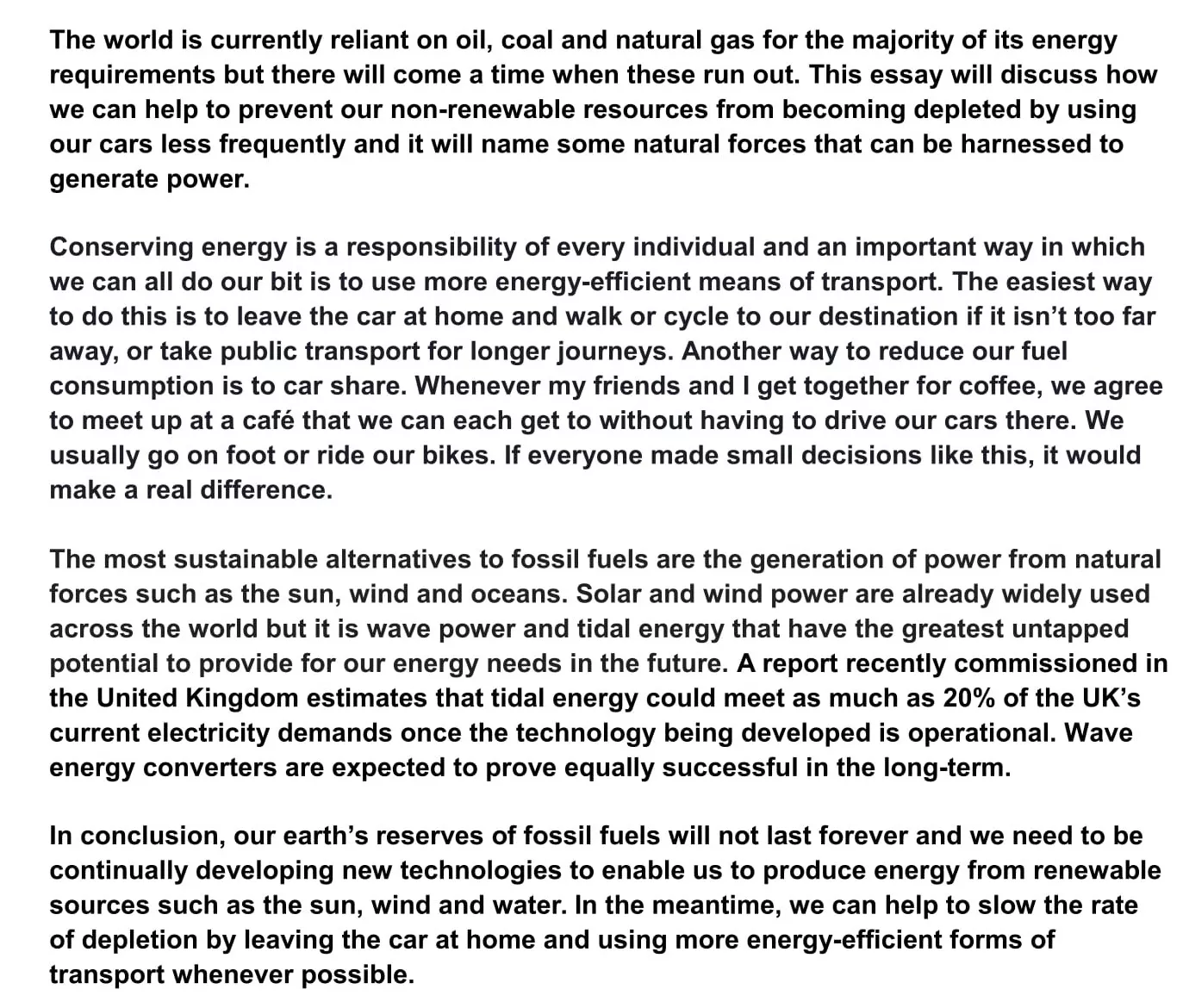
(351 words)
Go through this lesson as many times as you need to in order to fully understand it and put in lots of practice writing IELTS double question essays from past exam questions. Practice is the only way to improve your skills.
Would you prefer to share this page with others by linking to it?
- Click on the HTML link code below.
- Copy and paste it, adding a note of your own, into your blog, a Web page, forums, a blog comment, your Facebook account, or anywhere that someone would find this page valuable.
Like this page?
More help with ielts double question essays & other task 2 essays.
IELTS Writing Task 2 – T he format, the 5 question types, the 5 step essay writing strategy & sample questions. All the key information you need to know.
The 5 Types of Task 2 Essay – How to recognise the 5 different types of Task 2 essays. 15 sample questions to study and a simple planning structure for each essay type.
Understanding Task 2 Questions – How to quickly and easily analyse and understand IELTS Writing Task 2 questions.
How To Plan a Task 2 Essay – Discover why essay planning is essential & learn a simple 4 step strategy, the 4 part essay structure & 4 methods of generating ideas.
How To Write a Task 2 Introduction – Find out why a good introduction is essential. Learn how to write one using a simple 3 part strategy & discover 4 common mistakes to avoid.
How To Write Task 2 Main Body Paragraphs – Learn the simple 3 part structure for writing great main body paragraphs and also, 3 common mistakes to avoid.
How To Write Task 2 Conclusions – Learn the easy way to write the perfect conclusion for a Task 2 essay. Also discover 4 common mistakes to avoid.
Task 2 Marking Criteria – Find out how to meet the marking criteria in Task 2. See examples of good and poor answers & learn some common mistakes to avoid.
The 5 Task 2 Essay Types:
Step-by-step instructions on how to plan & write high-level essays. Model answers & common mistakes to avoid.
Opinion Essays
Discussion Essays
Problem Solution Essays
Advantages & Disadvantages Essays
Double Question Essays
Other Related Pages
IELTS Writing Test – Understand the format & marking criteria, know what skills are assessed & learn the difference between the Academic & General writing tests.
- IELTS Writing
- Double Question Essays
- Back To Top
* New * Grammar For IELTS Ebooks

$9.99 each Full Set Just $ 23.97
Find Out More >>
IELTS Courses

Full details...

IELTS Writing Ebook

Discount Offer
$7 each Full Set Just $ 21

Find out more >>
Testimonials
“I am very excited to have found such fabulous and detailed content. I commend your good work.” Jose M.
“Thanks for the amazing videos. These are ‘to the point’, short videos, beautifully explained with practical examples." Adari J.
"Hi Jacky, I bought a listening book from you this morning. You know what? I’m 100% satisfied. It’s super helpful. If I’d had the chance to read this book 7 years ago, my job would be very different now." Loi H.
"Hi Jacky, I recently got my IELTS results and I was pleased to discover that I got an 8.5 score. I'm firmly convinced your website and your videos played a strategic role in my preparation. I was able to improve my writing skills thanks to the effective method you provide. I also only relied on your tips regarding the reading section and I was able to get a 9! Thank you very much." Giano
“After listening to your videos, I knew I had to ditch every other IELTS tutor I'd been listening to. Your explanations are clear and easy to understand. Anyways, I took the test a few weeks ago and my result came back: Speaking 7, listening 9, Reading 8.5 and Writing 7 with an average band score of 8. Thanks, IELTS Jacky." Laide Z.
Contact
About Me
Site Map
Privacy Policy
Disclaimer
IELTS changes lives.
Let's work together so it changes yours too.
Copyright © 2024 IELT Jacky
All Right Reserved
IELTS is a registered trademark of the University of Cambridge, the British Council, and IDP Education Australia. This site and its owners are not affiliated, approved or endorsed by the University of Cambridge ESOL, the British Council, and IDP Education Australia.
- A Beginner’s Guide to IELTS
- Common Grammar Mistakes [for IELTS Writing Candidates]
Writing Correction Service
- Free IELTS Resources
- Practice Speaking Test
Select Page
IELTS Writing Task 2: Two-Part Questions
Posted by David S. Wills | Jul 18, 2018 | IELTS Tips , Writing | 1
Today we’re going to look at an IELTS writing task 2 question that often makes students a little worried: the two-part question . This is also sometimes referred to as “the direct question” as it is more direct than other types of writing questions, such as advantages and disadvantages or causes and solutions .
In this lesson, I will show you what this question looks like and explain how to answer it.
Table of Contents
What is a two-part question, two-part question examples, analysing the question, structuring a two-part question essay, sample answer.
In IELTS writing task 2, there are different sorts of questions you may be asked. One of them is called the two-part question (or sometimes “the direct question”). It is most commonly called a two-part question because it contains two distinct questions.
Of course, some other questions also contain two parts. For example, a problem and solution essay is two parts. However, what we mean by a “two-part question” is one that contains two questions . The reason this is sometimes called a “direct question” task is that the questions themselves are more direct than other IELTS writing task 2 question types, which instruct candidates to explore an idea. This is rather vague , whereas the two-part question is very specific .
To understand this idea better, let’s look at an example two-part question:
In education and employment, some people work harder than others. Why do some people work harder? Is it always a good thing to work hard?
Ok, the first thing that you may notice is that there are three parts to this question! However, the first part is actually a lead-in statement. It is not particularly important. The parts that you need to address in your essay are the two questions. This is why some people say “two-part question” and others say “direct question”.
Here is another example:
Happiness is often considered difficult to define. Why is this? What factors determine happiness?
Here the first question contains a pronoun, “this”, which refers back to the idea in the first sentence. In other words, the first question is “Why is it often considered difficult to define happiness?”
Finally, here is one more example question:
Success is often measured by wealth and material possessions. Do you think wealth is the best measure of success? What makes a successful person?
As you can see by now, each question has three parts: an introductory statement and two individual (but related) questions. You will see this exact format used with numerous IELTS topics .
Sometimes the lead-in statement will be very long, and sometimes the questions are quite closely linked. Other times the statement may be short or the questions ask quite different things.
How to Answer Two-Part Questions
The first thing to remember is: DON’T PANIC! Two-part questions often make students a bit nervous, but really they are not so bad. They are no more difficult to answer than the other IELTS task 2 question types.
In fact, this type of question may even be the easiest one to answer!
Although the questions themselves are sometimes a bit challenging, they are direct questions . This means that it is less likely you will stray off-topic while writing. In other words, your task is actually more straightforward than it would be with an agree/disagree question, for example.
Let’s look at an example question so we can analyse it. This is the first thing you should do in any IELTS writing task 2 essay, and it’s important to spend a minute or two thinking carefully about it.
Some parents buy their children whatever they ask for, and allow their children to do whatever they want. Is this a good way to raise children? What consequences could this style of parenting have for children as they get older?
We can take three steps to analyse this question.
- Let’s look at the first sentence: What is it about? It is about permissive parents – ie parents who give their children too much (or who give in to their child’s demands) and let them do too many things.
- Next, the first question contains a pronoun (“this”) which refers to the ideas in the first sentence, and asks if it’s good or not.
- The second question talks about the consequences – not for the parents, but for the children.
I have deliberately chosen a slightly difficult question here in order to show you how to answer it. Usually, the questions are a little more direct and obvious, but here you need to consider the three sentences in order, making sure to understand each fully.
In a situation like this, if you make an incorrect assumption about the first or second parts of the sentence, it may cause a serious lack of coherence and cohesion , in addition to poor task achievement .
For example, if you thought it was just about children not being made to study enough, you might write the next paragraph all about a lack of studying and the following one may come back closer to the correct idea because of the more specific question. This would look bad, indicating a lack of unity in your writing.
Thankfully, it is not difficult to create a perfect two-part essay structure. In fact, it is very easy!
Here is a basic essay template:
In a previous article, I talked about whether to use a 4 or 5 paragraph essay . This is one case when you definitely want to use a four-paragraph essay.
Here’s the video, if you want to review it:
I have lots more posts on the topic of IELTS essay structures. Here are a few:
- IELTS Writing Task 2 Essay Structures
- Planning IELTS Writing Task 2 Structure
- How to Structure a Paragraph
In this section, I will give you my sample answer to the above question, using the basic four-paragraph structure that I mentioned. Obviously, my ideas will be different to yours, but the structure which I outlined can be used 100% of the time.
In today’s society, some parents are becoming increasingly permissive. They do not impose sufficient discipline on their children, and in some cases buy them too many things. This essay will explore why this is not a good way to raise children and why it will have negative impacts upon them in future. While it is understandable that parents want to give their children expensive toys and let them run freely in the streets, this is actually not really an appropriate method of parenting. Having too many toys encourages children to be materialistic and does not offer them the same change to develop social skills like sharing. Furthermore, when children have asked for the toys, it gives them a sense of entitlement and even power over their parents. As for giving children too much freedom, there are obviously a great many dangers in this world from which they need to be kept safe. Children also need rules and boundaries to encourage them to develop into mature and responsible adults. If parents insist on this permissive style of parenting, their children will grow up with very different values from those of stricter parents. Children who were never forced to study will end up with poorer grades in school, and those who were given everything they wanted as children will expect everything to come easily as adults. In short, they will lead difficult and disappointing lives, in contrast with what their parents hoped. In conclusion, although it is tempting to give children whatever they want, parents ought to set rules and boundaries, and to be careful with how they reward children. If parents fail to impose a basic level of discipline, children may grow up with a poor attitude that will cause them and others to suffer.
There are really no words or phrases that are unique to the two-part question essay. Just use regular academic English as with any other IELTS task 2 question, and of course stick to the topic.
For my essay, I used the word “permissive.” It means allowing too much and not setting enough rules. You could use similar words like “liberal,” “easygoing”, “live and let live”, and so on, although they vary slightly in precise meaning.
Here are some more useful terms that you can use to talk about parents:
As always, remember to avoid IELTS phrases and other cliches. Learn new vocabulary by topic and in collocations rather than isolation.
Tips for Two-Part Questions
Finally, a few tips to remember:
- Practice this question type often before the exam – it’s pretty common!
- Make sure you understand each part of the question before answering.
- Always use the four-paragraph essay structure.
- Work on idea generation at home in order to come up with good, on-topic answers.
I made this article into a short video. Please give it a ‘LIKE’ and subscribe to the channel if you find it useful.
About The Author
David S. Wills
David S. Wills is the author of Scientologist! William S. Burroughs and the 'Weird Cult' and the founder/editor of Beatdom literary journal. He lives and works in rural Cambodia and loves to travel. He has worked as an IELTS tutor since 2010, has completed both TEFL and CELTA courses, and has a certificate from Cambridge for Teaching Writing. David has worked in many different countries, and for several years designed a writing course for the University of Worcester. In 2018, he wrote the popular IELTS handbook, Grammar for IELTS Writing and he has since written two other books about IELTS. His other IELTS website is called IELTS Teaching.
Related Posts
How to Describe a Bar Chart [IELTS Writing Task 1]
April 13, 2020
How IELTS Speaking is Marked
September 30, 2022
Speaking About Media [IELTS Vocabulary]
December 20, 2021
The Road to IELTS Success
January 25, 2019
could someone evaluate this and give the band score it deserves? here is my writing of the given topic….. In education and employment, some people work harder than others. 1. Why do some people work harder? 2. Is it always a good thing to work hard?
ans : It is often seen that some people put in more effort than others in the field of education and employment . The possible reasons could be due to the workload pressure or genuine passion .While passion for accomplishing task is a good thing, working hard due to constant pressure and other circumstances could be a problem . This essay explores the potential reasons as to why some work more than others and also discusses whether it is good to do so or not.
While students work hard due to their caliber and interest in studies working people work hard due to circumstances .Although there are a few students who study due to constant nagging by mentors or parents, most of them develop a genuine interest towards the subjects. Employers, on the other hand, work up to their innate potential to make both ends meet. For example, some workers work overtime that is for longer hours in order to earn higher salary or during the weekends to cope with the pending works . Sometimes they complete their tasks in advance in case they have any upcoming projects or plans outside the workplace to compensate for the missing working days.
Whether it is a good thing or a bad thing completely depends on the situation. Any work, no matter how important and urgent, if done against will and under high pressure will never give good outcomes . Instead it will lead to anxiety and stress if not accomplished on time. But if one is passionate and hungry for success and enjoys pursuing their interest, it will undoubtedly bear fruits and their hard work will eventually pay off.
All things considered, hard work is the key to success with respect to both education and employment. But it is important to make a note that one should have a great deal of passion and sincerity to achieve success and should not be forced to work due to helplessness or under pressure.
Leave a reply Cancel reply
Your email address will not be published. Required fields are marked *
This site uses Akismet to reduce spam. Learn how your comment data is processed .
Download my IELTS Books
Recent Posts
- How to Write an Overview for IELTS Writing Task 1
- Cambridge IELTS 19 – Sample Answers
- Commas and Time Phrases
- Ambition and Success: Sample IELTS Essay
- Do the Advantages Outweigh the Disadvantages? – Advice About This Question Type
Recent Comments
- David S. Wills on Writing Correction Service
- Laras on Writing Correction Service
- Faith on Writing Correction Service
- Lesson Plans
- Model Essays
- TED Video Lessons
- Weekly Roundup
- Skip to primary navigation
- Skip to main content
- Skip to primary sidebar
- Skip to footer

IELTS Advantage
IELTS Preparation Courses
IELTS Writing Task 2 Essay Structures
The four most common IELTS writing Task 2 questions are: Opinion, Advantages and Disadvantages, Problem and Solution Discussion
IELTS Task 2 Essay Structures
Knowing how to structure your IELTS Writing Task 2 essay is an essential skill that can make the difference between getting and not getting the band score you deserve. With that in mind, we have outlined the most common IELTS Writing Task 2 structures below.
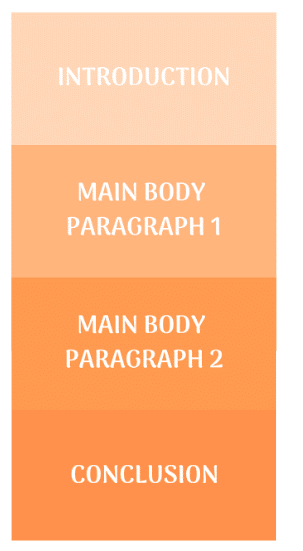
Nearly all of my Task 2 essays follow this basic structure: The sentences you put in each paragraph will depend on what type of question you get.
The five most common IELTS Writing Task 2 questions are:
- Opinion (Agree or Disagree)
- Advantages and Disadvantages
- Problem and Solution
- Discussion (Discuss both views)
- Two-part Question
Below I will outline examples and a structure approved by experienced IELTS teachers and examiners for each type of question. This will help you write a clear, coherent answer and hopefully boost your IELTS band score. I also include an example answer for each type of question so you can see the structure in a real essay.
Please note that these are general structures and may vary slightly depending on the question.
Please also note that no ‘one’ Task 2 essay structure will get you a high score. There are many types of structures that can get you a high score. These are just some I think are effective and easy to learn.
Please visit the lessons below for more detailed guidance on each type of question. I have provided a link at the end of each section.

Opinion Questions (Agree or Disagree)
Typical Question Words –
What is your opinion?
Do you agree or disagree?
To what extent do you agree or disagree?
Direct question.
Example Question –
Some people believe that unpaid community service should be compulsory in high school programmes (for example, working for a charity, improving the neighbourhood or teaching sports to younger children).
Essay Structure
Introduction
1- Paraphrase Question
2- Give your opinion and outline the main ideas.
Main Body Paragraph 1
1- Topic Sentence
2- Explain Topic Sentence
Main Body Paragraph 2
Conclusion
1- Summary of main points and opinion
Student Sample Answer
It is argued that volunteering should be made part of the school curriculum. This essay agrees with that suggestion completely because it help pupils develop soft skills and helps them gain much-needed work experience.
Education should not be limited to strictly academic pursuits, and those in education should also develop life skills, such as teamwork, empathy and self-discipline, and one of the best ways to hone these aptitudes is through community service. Serving those less fortunate than ourselves teaches us many lessons, including how to work with people from other backgrounds and the value of hard work, thus enabling us to hone these skills before becoming an adult. For example, many young people from wealthier countries take a gap year and help those less fortunate than themselves to increase their gratitude for what they have and improve their work ethic.
Many colleges and companies are also increasingly looking for this type of experience. Most school leavers have the same grades, and charitable work can help set you apart from other students when making college applications. For example, Cambridge and Oxford receive thousands of applications from straight-A students yearly and can only accept a small percentage of applicants. What you have done outside the classroom often differentiates you from everyone else and gets you that coveted spot.
In conclusion, teenagers should be made to partake in unpaid work as part of their schooling because it will help them learn things they wouldn’t ordinarily learn from their teachers, and it will also boost their chances of getting into third-level education.
For more detail on how to answer agree or disagree questions, please visit our opinion essay lesson .
Need help writing essays like this? Check out our ESSAY CORRECTION SERVICE .
Advantages and Disadvantages Questions
Typical Question Words
Discuss the advantages and disadvantages.
What are the advantages and disadvantages?
Example Question
Technology is being used more and more in education.
Essay Structure
2- Outline Main Points
Main Body Paragraph 1
1- State Two Advantages
2- Expand/Explain First Advantage
3- Expand/Explain Second Advantage
1- State Two Disadvantages
2- Expand/Explain First Disadvantage
3- Expand/Explain Second Disadvantage

1- Summary of Main Points
Student Sample Answer
It is argued that technology plays an ever-increasing role in schools and universities. Increased access to information and student freedom are the main advantages, whereas dependency on technology and decreasing levels of face-to-face contact are the main disadvantages.
Access to more information and student autonomy are the principal advantages of increasing the use of electronic devices in education. With the internet, students can access all the information available about any topic, regardless of what books and other resources are available in the school. Furthermore, students can focus on whatever topic or subject they want and study it in depth. A prime example of this is the number of online university courses available to students, covering a myriad of subjects that, up until recently, were unavailable to most learners. This has resulted in more people studying third-level degrees than ever before at a pace and schedule that suits them.
The main disadvantages associated with the increasing use of technology in education are the dependency on this technology and the decrease in face-to-face interaction between students. With many students now using the internet as their primary source of information, they often struggle to use other academic resources to find what they’re looking for. As well as this, students spend more time looking at computer screens by themselves than interacting with each other, which is thought to lead to lower levels of emotional intelligence. For instance, the recent explosion in smartphone use has been at the expense of genuine human interaction. This results in soft skills, such as verbal communication and empathy, being affected.
In conclusion, the benefits technology brings to education, such as unrestricted access to information and student autonomy, must be weighed against the drawbacks, such as dependency on this technology and the negative effects on human interaction.
For more detail on how to answer advantage and disadvantage questions, please visit our advantage and disadvantage lesson .
Discuss Both Views Question (Discussion Essay)
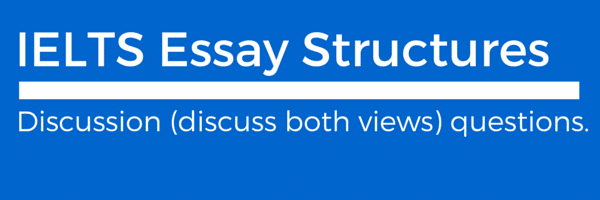
Discuss both points of view and give your opinion.
Example Question
Technology is being used more and more in education. Some people say that this is a positive trend, while others argue that it is leading to negative consequences.
Discuss both sides of this argument and then give your own opinion.
1- Paraphrase Question and/or state both viewpoints.
2- Thesis Statement
3- Outline Sentence
1- State first viewpoint
2- Discuss first viewpoint
3- Reason why you agree or disagree with viewpoint
4- Example to support your view
1- State second viewpoint
2- Discuss second viewpoint
Sentence 1- Summary
Sentence 2- State which one is better or more important
There is an ever-increasing use of technology, such as tablets and laptops, in the classroom. It is often argued that this is a positive development, whilst others disagree and think it will lead to adverse ramifications. This essay agrees that an increase in technology is beneficial to students and teachers.
The Internet has provided students with access to more information than ever before. This has allowed learners to research and learn about any subject at the touch of a button. It is therefore agreed that technology is a very worthwhile tool for education. Wikipedia is a prime example, where students can type in any keyword and gain access to in-depth knowledge quickly and easily.
However, many disagree and feel that technology deprives people of real human interaction. Human interaction teaches people valuable skills such as discourse, debate and empathy. Without these soft skills, many people find it difficult to become successful in work and their personal lives. Despite this, human interaction is still possible through the internet, and this essay disagrees that technology should be dismissed for this reason. For instance, Skype and Facebook allow people to interact in ways that were never before possible.
While the benefits of technology, particularly the internet, allow students to tap into limitless sources of information, some still feel that people should be wary of this new phenomenon and not allow it to curb face-to-face interaction. However, as long as we carefully consider the importance of human interaction in education, the educational benefits are clearly positive.
For more detail on how to answer discussion questions please visit our discussion essay lesson .
Problem and Solution Questions
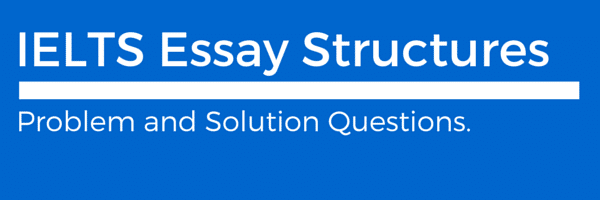
Problem and solution.
Cause and solution.
Students are becoming more and more reliant on technology.
What are some of the problems associated with reliance on computers, and what are some of the possible solutions?
2- Outline Sentence
1- State Problems
2- Explain First Problem
3- Explain Second Problem
4- Example of Second Problem
1- State Solutions
2- Explain First Solution
3- Explain Second Solution
4- Example of Second Solution
Learners are becoming increasingly dependent on technology, such as the Internet and mobile devices. This essay believes the main problems associated with dependence on computers are the lack of original thought and copying original work from others and suggests critical thinking classes and writing analysis software as the most viable solutions.
The principal problems with over-reliance on technology are people being unable to think for themselves and plagiarism. With access to so much information, students often rely on other people’s opinions instead of forming their own. As well as this, they often use search engines to answer a question and copy the text from a website rather than thinking about the question. This practice is prohibited in schools and universities and stunts students’ intellectual development because they will never truly think for themselves, which is what university is supposed to be for. For example, many teachers complain that students copy web pages straight from Wikipedia word for word rather than giving a reasoned answer to their questions.
Solutions to these worrying problems are special classes to focus on critical thinking and teachers using anti-plagiarism software to detect copying. If teachers create situations where students have to infer meaning and express opinions based on a small amount of information, this will ensure that students have an opportunity to develop these skills. Also, if students know that their assignments are being checked for plagiarism, this will be enough to deter them from doing so. For instance, many universities already use this kind of software to scan coursework for plagiarism, and it could be extended to include all homework by learners in both secondary and tertiary education.
In conclusion, the main problems with the overuse of technology in education are the lack of original thought and plagiarism. These can be solved through special classes that teach students analytical skills and plagiarism detection software.
For more detail on how to answer problem and solution questions please visit our problem and solution lesson .
Two-Part Questions
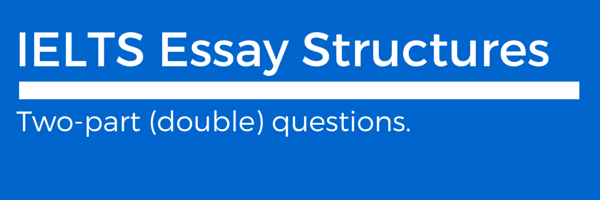
There will normally be a statement, and they will then ask you to answer separate questions.
As most people spend a major part of their adult life at work, job satisfaction is an important element of individual wellbeing.
What factor contributes to job satisfaction?
How realistic is the expectation of job satisfaction for all workers?
2- Outline Sentence (mention both questions)
1- Answer first question directly
2- Explain why
3- Further explain
1- Answer second question directly
As most adults spend most of their time at work, being content with your career is a crucial part of a person’s health and happiness. This essay will first suggest fair pay as a key element leading to job satisfaction, and it will then state that it is not very likely that everyone can be happy with their job.
The most important thing that satisfies someone at work is being compensated fairly. If those more senior than you respect you as a person and the job you are doing, then you feel like you are valued. A fair salary and benefits are important marks of respect, and if you feel you are being underpaid, you will either resent your bosses or look for another job. These two factors came top of a recent job satisfaction survey conducted by Monster.com, which found that 72% of people were pleased with their current role if their superiors regularly told them they were appreciated.
With regard to the question of happiness for all workers, I think this is and always will be highly unlikely. The vast majority of people fail to reach their goals and end up working in a post they don’t really care about in return for a salary. This money is just enough to pay their living expenses which often means they are trapped in a cycle of disenchantment. For example, The Times recently reported that 89% of office workers would leave their jobs if they did not need the money.
In conclusion, being satisfied with your trade or profession is an important part of one’s well-being, and respect from one’s colleagues and fair pay can improve your level of happiness; however, job satisfaction for all workers is an unrealistic prospect.
Can I get a band 8 or 9 following these structures?
Nobody can give you a Task 2 IELTS structure that guarantees high scores. Your score is dependent on how good your grammar and vocabulary are and how well you answer the question. A good structure will help you answer the question to some extent and boost your score for coherence and cohesion, but you must use relevant ideas and use these ideas well to answer the question.
You can see how my student scored a Band 8.5 in IELTS Writing here:

Next Steps
We hope you found those IELTS Writing Task 2 structures useful. Looking for some more sample questions? Here are over 100 sample questions from past exam papers.
If you would personalised feedback and guidance until you get the score you need, you can join the Waiting List for my VIP Course here.
About Christopher Pell
My name is Christopher Pell and I'm the Managing Director of IELTS Advantage.
I started IELTS Advantage as a simple blog to help 16 students in my class. Several years later, I am very humbled that my VIP Course has been able to help thousands of people around the world to score a Band 7+ in their IELTS tests.
If you need my help with your IELTS preparation, you can send me an email using the contact us page.

45,000+ students realised their study abroad dream with us. Take the first step today
Meet top uk universities from the comfort of your home, here’s your new year gift, one app for all your, study abroad needs, start your journey, track your progress, grow with the community and so much more.

Verification Code
An OTP has been sent to your registered mobile no. Please verify

Thanks for your comment !
Our team will review it before it's shown to our readers.

- Test Preparation /
Direct Question Essay in IELTS: Everything You Need to Know

- Updated on
- May 24, 2024
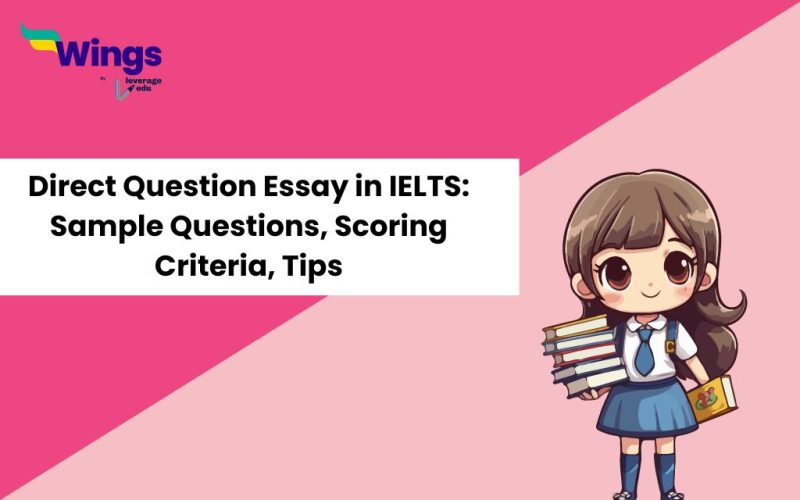
Get Your IELTS Writing Score Checked For FREE!
Get Your IELTS Writing Score Checked For Free!

Direct Question Essay IELTS: The IELTS Writing Task 2 demands test takers to write cohesive, nuanced, and insightful essays. This section includes a diverse spectrum of essay types, such as opinion pieces, problem-solution analyses, and advantage/disadvantage examinations. Notably, the Direct Question Essay, characterized by its explicit and directive nature, demands a clear and concise response within a 250-word limit. To know more about IELTS direct question essays, read the entire blog.
This Blog Includes:
Introduction paragraph, body paragraph 1, body paragraph 2, conclusion paragraph, task achievement , lexical resource, grammatical range and accuracy, maintain coherence, most common ielts direct essay sample questions, ielts direct question essay samples , 5+ tips for direct question essay ielts, ielts direct question essay: exam pattern 2024.
Sticking to the expected structure in IELTS direct question essays is crucial to avoid losing points and improve your chances of scoring better. Refer to the data given below to get a better understanding of the structure of IELTS Direct Question Essays.
Always start your essay with a concise, articulated and punchy introduction. Intros that pack a punch can rope in a lot of eyeballs and encourage them to read further. Begin with a succinct yet insightful phrasing of the assigned prompt, then offer a taste of the key arguments you’ll elaborate upon in the subsequent paragraphs.
Directly address the first question in the opening paragraph with a clear and comprehensive response.
In this paragraph, feel free to explore your second or third questions, bolstering your arguments with illustrative examples for greater clarity and impact.
Sum up your entire essay in this paragraph. Ensure that you have included all the major points in this part of the essay.
Direct Essay Questions IELTS: Scoring Criteria
The IELTS Direct Essay Questions are evaluated on the following factors:
Your essay should answer all the questions asked on the topic. You should use linkers and examples to make your essay more cohesive, comprehensible and impactful.
Diversify your lexical choices to enhance the persuasiveness and sophistication of your written arguments.
Evaluate your essay for grammatical inconsistencies that might detract from its persuasiveness and accuracy.
Your IELTS Direct Question Essay should be coherent and comprehensible to the readers. It must be segregated into concise and articulated paragraphs that are easy to read and comprehend.
Here are the most common IELTS Direct Essay Sample Questions.
Refer to the following samples to get a solid idea about IELTS direct question essays and how to answer them.
Q: Online shopping is significantly increasing. What impact does this have on people, what are the disadvantages, and what are the job opportunities?
Ans: The internet’s discovery has transformed numerous facets of people’s lives, giving rise to online shopping and sparking significant societal changes. While it delivers numerous benefits, it also introduces disadvantages that warrant discussion.
One of the main disadvantages of online shopping is that it lacks a tangible experience as consumers can not touch, feel, or try the items they are purchasing beforehand. It not only causes dissatisfaction but has also increased return rates. In addition to this, the impersonal nature of online shopping has led to poor customer service. Apart from this, another significant concern of people is the risk of fraud and identity theft that it carries. With the growing prevalence of online transactions, consumers face a heightened risk of compromising their personal and financial information.
Despite these challenges, the rise of online shopping has created numerous job opportunities. The e-commerce industry is booming and requires a wide range of skills such as web development, digital marketing, logistics, and customer service. Due to this, new jobs have been created, allowing individuals to start their businesses. Furthermore, the need for improved cybersecurity has led to an increase in demand for this field. In today’s fast-paced world, businesses are emphasizing safeguarding their customers’ data and ensuring a secure online shopping experience, making cybersecurity an essential and integral part of the e-commerce industry.
In conclusion, although online shopping comes with a share of drawbacks, it also brings opportunities for various employment prospects. It is crucial for both consumers and businesses to effectively tackle these challenges while capitalizing on the opportunities provided by this expanding industry.
Q: Fast food is a part of life in many places. Some people think this has bad effects on lifestyle and diets. How is the consumption of fast food bad for people? Why should one avoid fast food?
Ans : The omnipresence of fast food in today’s society is undeniable, as it has become an integral part of every individual’s life worldwide. However, fast food’s detrimental effects on our lifestyle and diet are unmistakable, and I wholeheartedly agree with this viewpoint for several reasons.
Fast food is often high in sugar, unhealthy fats, and calories while providing very few nutrients. If someone consumes it regularly, there is a high probability that it can lead to obesity, heart disease, diabetes, and other health-related problems. It is concerning as in the present scenario many countries are facing high rates of childhood obesity cases. In addition to this, the convenience of fast food has encouraged a sedentary lifestyle. Daily consumers tend to invest less time in preparing home-cooked meals and participating in physical fitness activities, contributing to social isolation. This lifestyle shift can have adverse effects on people’s overall well-being.
Moreover, fast food promotes overconsumption through clever marketing strategies. For instance, the ubiquitous practice of offering “value meals” with larger portions at only a slightly higher cost may entice customers to opt for larger servings than they need. Coupled with the addictive appeal of certain fast food ingredients, such as the high levels of salt, sugar, and fat, this marketing approach can significantly contribute to overeating and, consequently, weight gain.
In conclusion, while fast food may be an enticing option for many individuals, it comes with adverse impacts on health and overall lifestyle. Therefore, people need to make conscious decisions regarding their food consumption, and governments should actively play a pivotal role in promoting healthy eating habits. This may involve enacting regulations on fast food advertising, providing education, and encouraging physical activity.
Here are the top tips for direct question essays in IELTS writing task 2. Refer to them to bolster your chances of scoring better in IELTS writing.
- Take a good look at the test questions before diving in. It’ll save you time and frustration in the long run, and make sure you’re answering what the examiners want to know.
- You should keep a formal tone while writing direct-question essays in IELTS writing task 2.
- Individuals must stick to the given word limit. Exceeding the word limit can cause you to lose marks and time. Write your essay with a word count of at least 250-270 words.
- Set a time restriction during your preparation to enhance your overall speed and accuracy. During your actual exam, you will get around 40 minutes to write a direct-question essay. Therefore, practising under time constraints can help you get accustomed to the actual time crunch you’ll face during the test.
- A proper content structure must be followed, i.e., begin with an introduction paragraph, a two-body paragraph and end the essay with a concise conclusion.
- Make your intro concise and to the point. In other words, keep them tight, clear, and accurate to the topic.
- The main body paragraphs of your essay should answer the questions asked in the question.
- Refined writing with proper grammar and vocabulary makes a big impression and showcases your language proficiency.
So that was all about IELTS direct essay questions. Hope the blog has answered your queries regarding the topic.
Ans. The IELTS direct-question essay is divided into an introduction, two body paragraphs and a conclusion.
Ans. Test takers can use a range of linkers, adverbial phrases, references, and punctuations to bolster their overall scores in IELTS writing.
Ans. The IELTS Writing Task 2 requires individuals to complete the task within 40 minutes.
Visit the Leverage Live page of Leverage edu or contact our study abroad experts at 1800-57-2000 to strengthen your scores and application to secure your spot in your dream college.
Shubham Das
Shubham Das has been working as an educational content writer for the past two years and has a background in filmmaking & screenplay/ teleplay writing. He is fascinated by the human psyche, literature and cinema.
Leave a Reply Cancel reply
Save my name, email, and website in this browser for the next time I comment.
Contact no. *

Connect With Us
45,000+ students realised their study abroad dream with us. take the first step today..

Resend OTP in

Need help with?
Study abroad.
UK, Canada, US & More
IELTS, GRE, GMAT & More
Scholarship, Loans & Forex
Country Preference
New Zealand
Which English test are you planning to take?
Which academic test are you planning to take.
Not Sure yet
When are you planning to take the exam?
Already booked my exam slot
Within 2 Months
Want to learn about the test
Which Degree do you wish to pursue?
When do you want to start studying abroad.
January 2025
September 2025
What is your budget to study abroad?

How would you describe this article ?
Please rate this article
We would like to hear more.
Have something on your mind?
IELTS Preparation with Liz: Free IELTS Tips and Lessons, 2024
- Test Information FAQ
- Band Scores
- IELTS Candidate Success Tips
- Computer IELTS: Pros & Cons
- How to Prepare
- Useful Links & Resources
- Recommended Books
- Speaking Part 1 Topics
- Speaking Part 2 Topics
- Speaking Part 3 Topics
- 100 Essay Questions
- On The Day Tips
- Top Results
- 50% DISCOUNT
IELTS Model Essay -Two Questions Essay Type
IELTS Writing Task 2 Two Questions Essay is basically a Direct Questions Essay where you are given one, two or three direct questions to answer. Instead of being given task, such as “Discuss both sides.”, you are given specific questions to answer about a given topic.
IELTS Two Question Essay Task Sample
Below you see a two question essay for IELTS Writing Task 2.
More and more adults are playing computer games. Why is this happening? Is it a positive or negative trend?
As you see, there are two tasks:
- to explain what the causes are for this topic
- to decide whether you think this is a positive trend or negative trend
These two tasks are of equal importance. This means that for your body paragraphs, you must address each question equally and explain each with equal length. This is actually part of the Task Response marking criterion, which counts for 25% of your writing task 2 marks. Click here: WRITING T2 MARKING CRITERIA WITH TIPS
Useful Tips: IELTS Two Direct Questions Essay
The main topic in the essay question is Technology and the specific topic is Computer Games and Adults. I’ve provided a list of tips to help you tackle this type of essay question.
- There is only one issue to tackle : computer games. This is lucky. It is an easy essay question. Some essay questions are more complex and have two separate issues to tackle.
- The issue is specific: This means it is specifically relating to adults and your essay should not discuss why children play computer based. All IELTS essays must be very focused to the precise task you are given.
- There are two questions to answer . I call this type of question a “Direct Question Essay”. The first question is about causes of the trend. You might have one main cause or two causes. The second question is about evaluating whether this trend is good or bad. Whenever you are asked to choose, it means you must give your opinion.
- Think of some examples of computer games that adults play. You need to spend time on this aspect of the question. The deeper you think about this, the more relevant your main ideas will become. For example, are there any computer games that require intelligence? How have computer games changed over the years? Is this a reason why so many adults now play games? The more you think, the better your ideas for tackling this essay will be.
- Think about what attracts adults to these computers games. What do they get out of it?
- Then think about whether you, personally, think this is good or bad. Do adults gain anything from playing computer games or are computer games a complete waste of time for them? Are there any negative consequences of adults doing this?
- After you brainstorm , choose the ideas that are the most relevant and the easiest to explain well. You don’t get a high score because you have lots of ideas. You get a higher score for presenting specific ideas which are well developed and highly relevant.
- Body Paragraphs: f you have two questions to cover. It is logical to have two body paragraphs . Being logical in your choice of paragraphing is important.
- Provide a clear position in your introduction as to whether you think this is a positive or negative point. Being clear in the introduction helps the examiner follow your body paragraphs more easily and this will increase your score. If you think it is positive – make it clear. If you think it is negative – say so. If you think “it depends” – make sure you word it clearly and explain it clearly in the body paragraphs – never sit on the fence when you are asked to choose. The easiest approach is a positive or negative one (a one-sided approach). The “it depends” approach is harder and requires stronger language skills.
Model Essay for IELTS Two Direct Questions
It seems that the current trend is for an increasing number of adults to enjoy playing computer games in their free time. With the development of game technology, it is hardly surprising that adults are playing games, but whether it is positive or negative depends on the games played and the time spent on them.
In terms of why so many adults are choosing to spend time playing computer games, it is mainly because the technology behind the games is becoming more sophisticated. Initially, when games first came out, they were very simplistic and appealed mainly to children. However, things have moved on since then and games have become visually appealing, very absorbing, require great dexterity and some also have a strategic challenge to them which adults particularly like. Such games can attract professional adults looking to hone tactics and skills to other adults wishing just to relax and switch off.
However, whether this trend in adults towards computer games is beneficial or not can be challenged. Some adults use complex, challenging games as a form of escapism which keeps their mind sharp and helps them relax at the same time. As long as the time spent on such games is balanced with other healthier pursuits, it can be constructive. Unfortunately, adults who ignore their physical health and spend too much time on mindless, repetitive games develop a sedentary lifestyle which can be detrimental to their wellbeing.
In conclusion, computer games have become more fascinating and tempting to adults. While games that help develop tactics and knowledge might be advantageous, no game, particularly senseless games, should be played to excess and certainly should not replace healthier leisure activities.
Word count = 276
RECOMMENDED FOR YOU
- ALL MODEL ESSAYS & TIPS FOR WRITING TASK 2
……………………………………………………
FREE SUBSCRIBE Subscribe to get new lessons & tips by email. Email Address Subscribe
An increasing number of adults are addicted to computer games today. The main reason behind this increment is the influence of social media marketing, which is done by the computer games industry. However, this is a negative trend because this addiction leads to certain health disorders.
The major factor that creates this situation is the marketing strategy of gaming industry. Marketing professionals of this industry mainly focus social media users, and they allow users to see their very attractive game advertisements while users are browsing on the FaceBook or YouTube. If they click on them, they are taken to short but very impressive games, which motivate them to play these games as a habit. In the long run, this becomes an addiction. For instance, Michelin Sri Lanka revealed that 78% of their employees who play games regularly have started this because of social media advertisements.
This is a negative trend due to the possible health impact on people who play games frequently. Not only looking at a digital screen could be harmful to vision but also it creates even worst results as many of them avoid doing physical exercise. If someone is addicted to play computer games, they spend most of their free time with this habit. Hence, they do not get enough exercise to burn extra calories and fat, which leads to diseases, such as high blood pressure and cardio-vascular disease. For example, in Sri Lanka, more than 68% of adults who play computer games suffer from non-infectious diseases.
In conclusion, social media advertisements significantly increase the number of adults who play computer games. Nonetheless, this is a negative development because this degrades their health.
My website does not offer a feedback or marking service, but I’ll just give you one comment to help you develop. In the first sentence of a body paragraph (a topic sentence), you must not refer to the issue as “this”. For example, you wrote “The major factor that creates this situation is the marketing strategy ….”. Each body paragraph is like starting a fresh new answer. So, the issue needs to be repeated. You should have written “The major factor that leads to an increasing number of adults playing computer games is the marketing strategy ….”. We only use “this” or “it” to refer to something within a paragraph, not between paragraphs for IELTS writing task 2 essays.
I decided to try writing a direct question essay but I’m not sure if it is any good can you check it out and let me know where I need to improve?
Some people say the main way to be happy is to have a lot of money. How might having a lot of money make people happy? What other thing in life can make people happy?
Many say money can be a source of joy in one’s lifetime, It is true money can solve a majority of problems and give you a sense of freedom. However, there are different ways in which one can be happy.
Money plays a crucial role in our lives, we need money in our day-to-day activities. Cash gives you financial freedom and security. With Money, you can travel to any country of choice in luxury, live the extravagant life people dream to live and buy expensive items. For example, if I wanted to buy anything, I could choose what I wanted without looking at the price. Also, the thought of having cash makes you worry less. Money allows you to have a cheerful and blissful life.
On the other hand, Finance is not the only way to happiness. There are various ways of being happy like the love we are showered with from our family and friends. Being loved gives you peace of mind. It is true money is great but money without love attracts the wrong crowd. Furthermore, another way is self-satisfaction. The thought of achieving a goal or dream makes one joyful. For instance, imagining preparing for an exam and doing well in it, gives you a sense of happiness.
To conclude, Although cash can make our lives comfortable and free from financial crises, we can not depend on it alone to make us feel happy. There are other ways such as love and self-satisfaction. With this, we can always find happiness.
Although I don’t offer a feedback service, I’ll give just a couple of points. 1) you’ve got the right structure with ideas well organised into paragraph 2) pay attention to the correct use of capital letters – you will be marked down if you use capital letters incorrectly 3) the word “like” cannot be used as a linking word or as a substitute for “for example” 4) make sure you are aiming for between 270 and 290 words – this essay is quite short. You should extend your body paragraphs. Otherwise, well done!
I was impressed by your work. It’s really beneficial! Thanks.
I’m glad it’s helpful 🙂
This is awesome, there are so much new vocabulary that I can learn from. Thank you Liz! And I wanna ask if all model essays are in the “model essay” category? I’m a new comer and I’m looking for as many well-written writings as possible, like yours!
There are a lot of model essays online. I do not know their quality or how safe they are to use a models. Not all websites are written by professional, experienced teachers who have completed the IELTS examiner training. The models on my essay are safe to use as a guide.
I received my IELTS result today and I scored 7.5 overall band score. I can’t thank you enough for your valuable help and guidance.
More than IELTS, I’m more confident than ever and look forward to continuing this learning further.
Thanks again and take care.
Best Regards, Kamlesh
I’m so pleased for you, Kamlesh! Very well done to you!! I do hope you continue learning. One day I plan to start an English Liz Youtube channel so that people can keep learning beyond their IELTS test 🙂
That would be perfect <3
Thank you so much, Liz. I really appreciate your fantastic work.
You’re welcome 🙂
Good evening Liz. I’m grateful for your guidance and tutelage as I scored 7.5 in my writing, 7.5 in speaking, 7.0 in listening and 6.0 in reading after just a short time with you. I’m optimistic in my next attempt I should get the desired scores. You’re a great teacher ma’am.
I wish you lots of luck in your next test 🙂
Rituparna Saha says April 5, 2024 Thank you Liz for all your support and guidance on Writing Task 2. I greatly appreciate your efforts.
I took my IELTS test a few days ago. The results are out and I got a band 7 in writing with an overall band 7.5 in just a week. For writing I only watched your videos and took notes of all the points you taught. I did not even practice writing much, just referred to your videos and read all the materials on the website. Your content is pure gold and you are an amazing teacher. Ilysm
Very well done with your results!! Many people struggle to hit band 7 in writing. Congrats!
this is Soo nice Liz I have been following you and your materials are helpful kindly would like to know where I can download the Cambridge book or if you can share any regards Hellen
The IELTS Cambridge Test Books are copyrighted so I can’t share them. However, you can find new as well as second hand copies on Amazon or possibly in a local educational store.
I don’t feel the introduction is clear, and there is no clear opinion.
“it depends” indicates the opinion. It shows that the writer intends to be specific about when it is positive and when it is negative because their opinion covers both. This can often be the case with IELTS essays that require an opinion. You do not have to choose positive or negative and be 100% on one side. It is 100% acceptable in IELTS but it is a more difficult opinion to create if one’s English language isn’t strong.
Hello Liz, is it okay to write a contrast (one point) before the conclusion paragraph in agree or disagree essay? Thank you.
This is not an agree/disagree essay. The Opinion Essay is an agree disagree essay which requires you to agree, disagree or have a partial agreement with an opinion given by IELTS. That essay is not an Opinion Essay because you aren’t being asked to respond to an opinion given by IELTS. This essay is a Direct Questions Essay which may or may not require an opinion depending on the questions you are given. In an Opinion Essay, you introduce your opinion in the introduction and the whole essay explains your opinion. You can’t suddenly put a different opinion further down the essay. Your opinion must be consistent throughout the whole essay. I recommend you get my advanced lessons because they explain in detail how to tackle an Opinion Essay. You can find them in my online store: https://elizabethferguson.podia.com/
Thanks a lot liz.
Hi dear Liz. Hope you are fast recuperating. I have written the following intro. ” There is a growing propensity among the youth to play computer games. This is due to indulgence of parents and can have possible detrimental effects.” I know you don’t comment on write ups, but this is with a hope, in case…
I’ll just make one comment. I made a list of points to consider. Point 3 was important. This isn’t about youths. It’s about adults, which means people in their early 20’s, 30’s, 40’s, 50’s etc. And because it is about adults, it cannot be related to “indulgence from parents”. If you make this mistake, most of your essay will be off topic. That is the reason I wrote point 3. Take a look again because it’s an important lesson to learn.
This writing test sample answer makes a whole lots of sense to me. Well appreciated 👍👍👍.
I’m glad it made sense. IELTS isn’t difficult once you understand more about the test and the aims you should have.
Hi, Due to the financial crisis, I lacked many things like IELTS practice/preparation classes and missed many classes from a good teacher like you.
therefore, if you have any better offer like a full free studentship & give me the opportunity. Thank you in advance for your kind coope
This website has hundreds of page of free practice lessons, tips, topics, videos, advice, information, model answers etc. Use them well. Learn from each page and take your time. Then use the IELTS Cambridge test books for full test practice at home.
Thank you so much Liz for your valuable tips and techniques 🙏❤️
I’m glad it was helpful 🙂
Thank you for this it’s very helpful Liz. I greatly appreciate your efforts
Speak Your Mind Cancel reply
Notify me of follow-up comments by email.
Notify me of new posts by email.
ADVANCED IELTS

Recent New Lessons
Big discounts – advanced ielts lessons and e-books, questions about sport for ielts speaking part 3, 50% discount on advanced ielts – ends today, ideas in ielts essays & in ielts speaking, test yourself with linking words.

Click Below to Learn:
- IELTS Test Information
- Writing Task 1
- Writing Task 2
Copyright Notice
Copyright © Elizabeth Ferguson, 2014 – 2024
All rights reserved.
Privacy Policy & Disclaimer
- Click here: Privacy Policy
- Click here: Disclaimer
Return to top of page
Copyright © 2024 · Prose on Genesis Framework · WordPress · Log in

IMAGES
VIDEO
COMMENTS
The IELTS Writing Task 2 has an essay type known as the 'Direct Question Essay', which is a crucial component of the IELTS exam. It evaluates your ability to express your ideas, analyze a given topic, and provide a clear, well-structured response. In this comprehensive guide, we will explore the structure of IELTS Writing Task 2: Direct ...
Below is a list of sample essay questions for IELTS direct questions essays which can come in writing task 2. These essay types are also known as two question essays (although it is possible to get more than two questions). Direct Questions Essay Tips. spend time planning the answers to the questions; each question must have one main point as ...
Step 4: Structure Your Essay. The final step in the planning process is to structure your essay. This simply means deciding which main ideas to put in which paragraphs. I would recommend a simple structure like this: Paragraph 1: introduce the essay. Paragraph 2: discuss your answer to the 1st question.
A. In the IELTS Writing Task 2, a Direct Question Essay requires you to respond to one or more questions directly related to a given topic. You need to address each question in a structured manner, typically including an introduction, body paragraphs for each question, and a conclusion.
It's easy to learn and will enable you to quickly plan and write a high-level essay. 1) Introduction. Paraphrase the question. Outline sentence - state your answer to both questions. 2) Main body paragraph 1 - Answer question 1. Topic sentence - state your answer. Explanation - develop the idea.
For example "Discuss both sides and give your opinion" is categorised by many teachers as a Discussion Essay, but it still requires you to give an opinion. You were given a "Two Question Essay" or a "Direct Questions Essay". Please remember that IELTS do not categorised essays - teachers do.
For example, a problem and solution essay is two parts. However, what we mean by a "two-part question" is one that contains two questions. The reason this is sometimes called a "direct question" task is that the questions themselves are more direct than other IELTS writing task 2 question types, which instruct candidates to explore an idea.
The five most common IELTS Writing Task 2 questions are: Opinion (Agree or Disagree) Advantages and Disadvantages. Problem and Solution. Discussion (Discuss both views) Two-part Question. Below I will outline examples and a structure approved by experienced IELTS teachers and examiners for each type of question.
Write your essay with a word count of at least 250-270 words. Set a time restriction during your preparation to enhance your overall speed and accuracy. During your actual exam, you will get around 40 minutes to write a direct-question essay. Therefore, practising under time constraints can help you get accustomed to the actual time crunch you ...
There are two questions to answer. I call this type of question a "Direct Question Essay". The first question is about causes of the trend. You might have one main cause or two causes. The second question is about evaluating whether this trend is good or bad. Whenever you are asked to choose, it means you must give your opinion.